How to Write Geography Essay: Topics and Examples
Table of contents
- 1 What Is Geography Essay
- 2 Choosing a Topic
- 3 Research and Data Collection
- 4 Planning the Essay
- 5 Writing the Essay
- 6 Examples of Geography Essays
- 7 Unlocking the World: Key Insights from Our Geographic Exploration
Welcome to the dynamic world of geography essays, where understanding the Earth’s surface becomes an enlightening journey. This article serves as a comprehensive guide to writing a geography essay, starting with the crucial step of selecting a captivating topic. We’ll navigate through various popular topics, emphasizing the importance of effective research and data collection.
In this article, we’ll cover:
- How to select engaging and relevant geography essay topics.
- The importance of thorough research and effective data collection methods.
- Strategies for planning and organizing your geography essay for clarity and impact.
- Tips for writing a compelling geography essay, including structuring and presenting arguments.
- Analyzing examples of successful geography essays to guide and inspire your work.
As we transition into the details, prepare to enhance your understanding and skills in geography essay writing.

What Is Geography Essay
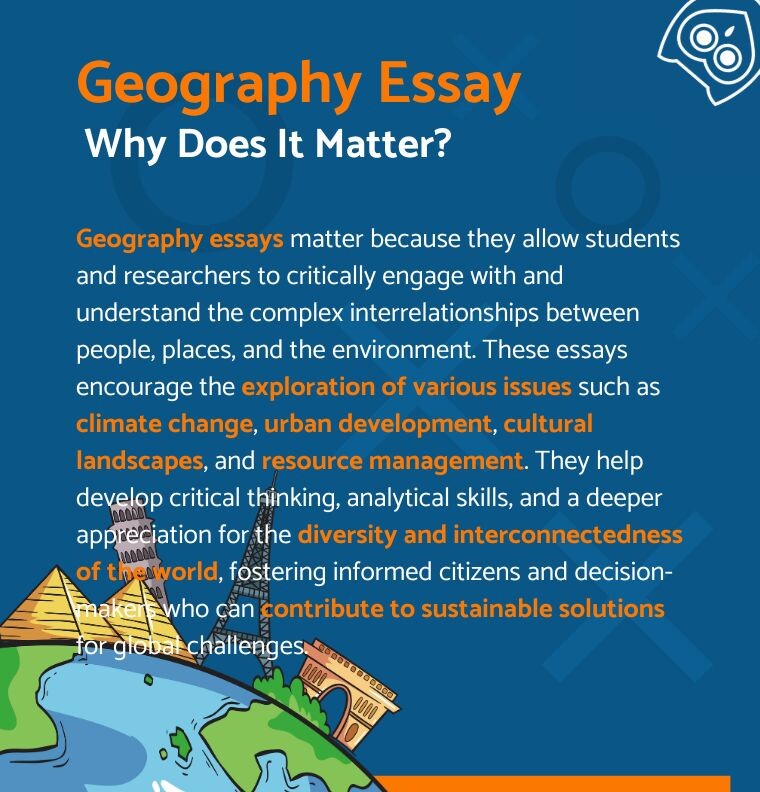
As we delve into the essence of a geography essay, it’s important to understand that it meticulously examines Earth’s landscapes and human activities. Furthermore, it aims to analyze how these two aspects interact, focusing on spatial relationships and patterns. Transitioning into the specifics, such essays often delve into particular geographic issues, aiming to broaden our comprehension of the world.
Moreover, when writing a geography essay, one must include accurate geographical data. This data, encompassing maps, statistics, and case studies, is crucial for a well-grounded analysis. Consequently, the essay should present facts and interpret them, offering fresh insights into the discussed topic.
Additionally, it’s noteworthy that an essay on geography stands out from others due to its unique subject matter approach. It demands a keen eye for detail and a profound understanding of the world’s physical and human dimensions. This requirement makes crafting such an essay a challenging yet fulfilling endeavor.
Lastly, the primary goal of a geography essay is to enlighten and inform. It persuades readers to view the world through a geographical lens, grasping the complex interplay between humans and their environment. This type of essay transcends mere academic exercise, serving as a means to foster a deeper appreciation for our world and its complex dynamics.
Choosing a Topic
The crucial point for a successful geography essay is selecting an engaging and appropriate topic. To choose a topic that resonates, consider current events, your interests, and the scope of your assignment. A good topic should captivate your interest and offer sufficient scope for in-depth study and analysis.
Popular geography essay topics often revolve around climate change , urban development, and cultural landscapes. These topics provide a rich ground for exploration and allow for diverse perspectives and interpretations. For example, a thematic essay on geography could focus on how urbanization affects local ecosystems or how cultural practices shape landscape use.
- Analyzing the Direct Impact of Climate Change on the Amazon Rainforest’s Biodiversity
- Urbanization in Mega Cities: Environmental Consequences and Sustainable Solutions
- Wind and Solar Power: Pioneers of Sustainable Energy Landscape
- Managing Water Scarcity in the Middle East: Strategies and Challenges
- The Amazon Deforestation Crisis: Causes, Impacts, and Global Responses
- Spatial Inequality: A Detailed Look at Poverty in Sub-Saharan Africa
- The Dynamics of Population Growth and Overconsumption in Asia
- Cultural Preservation of Indigenous Peoples in the Amazon Basin
- Earthquakes in Japan: Analyzing Causes, Effects, and Preparedness Strategies
- Geography’s Role in the Rise and Fall of the Roman Empire
- Implementing Sustainable Agricultural Practices in India for Food Security
- The Kashmir Conflict: A Geopolitical Analysis of Border Disputes
- The Growing Crisis of Climate Refugees in the Pacific Islands
- The Importance of Urban Green Spaces in New York City’s Environmental Health
- The Impact of Globalization on Maori Culture in New Zealand
- Ecotourism in Costa Rica: Balancing Economic Benefits and Environmental Preservation
- Addressing Ocean Plastic Pollution: Case Studies from the Great Pacific Garbage Patch
- The Nile River Conflict: Water Politics in a Changing Climate
- Preventing Desertification in the Sahel: Strategies and International Cooperation
- GIS in Disaster Management: Case Studies of Earthquake Response and Recovery
- Measuring the Effects of Glacial Melting on Greenland’s Coastal Communities
- Tracing the Economic Geography of the Silk Road in the 21st Century
- The Health Impacts of Air Pollution in Beijing: Urban Policies and Challenges
- Vulnerable Communities: Assessing the Socioeconomic Impacts of Climate Change in Bangladesh
- The New Face of Migration: Syrian Refugees and European Response
- The Critical Role of Metropolitan Areas in Combating Global Warming
- Saving Madagascar’s Rainforest: Conservation Strategies and Challenges
- The Transition to Renewable Energy in Germany: A Model for the World?
- Satellite Imagery in Land Use Changes: A Study of the Brazilian Amazon
- Arctic Sovereignty: The Geopolitical Implications of Melting Ice Caps for Global Powers
To guide and inspire your topic selection, you can use geography essay examples. These examples showcase a range of topics and approaches, helping you understand what makes a topic both engaging and feasible for study. Remember, a well-chosen topic is the first step toward a compelling and insightful geography essay.
Research and Data Collection
To talk about thorough research, it is the backbone of any geography study, providing the factual and theoretical foundation to understand complex geographical phenomena. To explain why the study of geography is important, one must delve into diverse and reliable sources that offer insights into how geographical factors shape our world and affect our lives. This research underpins the type of geography being studied, whether physical, human, or environmental.
Collecting geographical data can be done through various methods. Firstly, fieldwork is essential, especially for physical geography, as it allows for the direct observation and measurement of geographical features and processes. For human geography, surveys and interviews can yield valuable data on human behaviors and social patterns. Moreover, a thorough literature review also helps understand existing research and theories, providing a critical context for new findings.
Furthermore, evaluating sources for their credibility and relevance is vital. This involves checking the qualifications of the authors, the rigor of their methodologies, and the recency of their findings. Reliable sources are peer-reviewed and come from reputable academic or scientific institutions. What is more, ensuring the credibility of sources strengthens the arguments made in a geography essay and enhances the overall understanding of the topic.
In summary, comprehensive research and careful data collection are fundamental in geography. They enable a deeper understanding of how geographical aspects shape our environment and lives, which is central to the discipline.
Planning the Essay
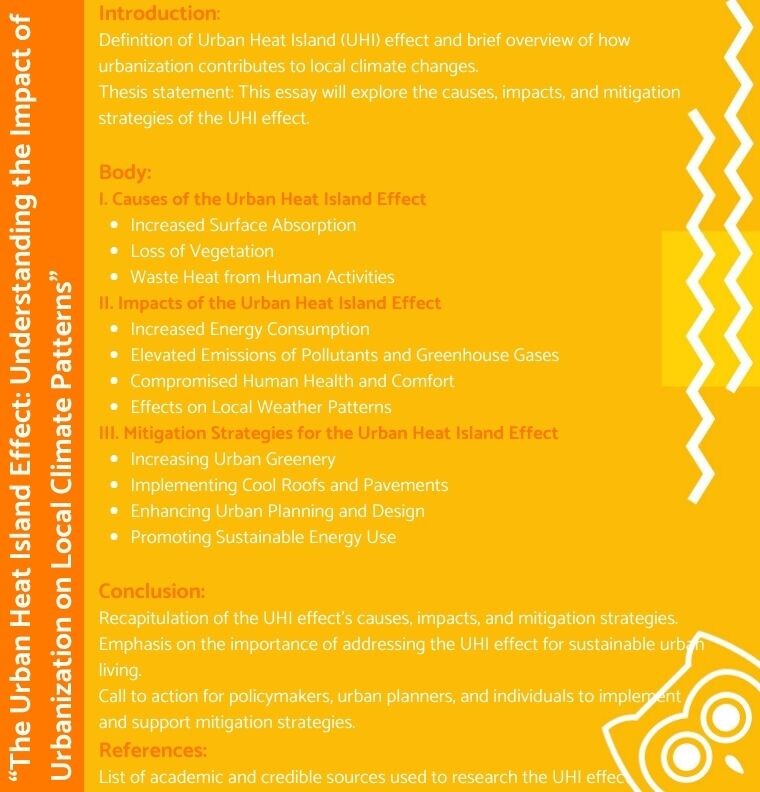
When you start planning a geography essay, it begins with creating an outline to organize thoughts and research. This step is crucial as it helps structure the essay logically, ensuring a smooth flow of ideas. Start by listing major points and supporting evidence. This framework guides the writing process and maintains focus on the chosen topic. Planning involves outlining the essay and crafting a compelling thesis. Planning involves outlining the essay and crafting a compelling thesis. This process ensures the essay remains focused and coherent, addressing the chosen geography topic. By establishing a clear roadmap for the essay, writers can navigate their arguments and evidence with precision, avoiding common pitfalls such as digression or ambiguity. Now, with our plan in place, let’s transition to examining the structure more closely, exploring how to effectively organize our thoughts and research into a well-structured essay that engages and informs the reader.
Writing the Essay
When you finally start writing, a geographical essay involves several key steps, each demanding attention to detail and a balance between descriptive and analytical writing. This balance is crucial in creating an essay about geography that informs, engages, and persuades.
The introduction sets the stage. Start with a hook that grabs the reader’s attention, followed by background information that provides context to the topic. This section should conclude with a clear and concise thesis statement that guides the rest of the essay.
In the body, organize paragraphs thematically or chronologically , depending on the essay’s focus. Each paragraph should start with a topic sentence that relates to the thesis. Following this, present your arguments and support them with geographical theories and data. This is where you incorporate detailed information from your research, including statistics, case studies, and examples. Make sure to explain how this data supports your arguments. A geography research paper demands precision in presenting data and clarity in its interpretation.
When discussing geographical theories, link them directly to your topic. This shows your understanding of the subject and how these theories apply to real-world scenarios. Remember, each paragraph should have a smooth transition to the next, maintaining a coherent flow of ideas.
In the conclusion, summarize the key points of your essay. Restate the thesis in light of the arguments and evidence presented. The conclusion should not introduce new information but encapsulate what the essay has covered. It’s also an opportunity to emphasize the importance of the topic, suggesting potential areas for future research or implications of your findings.
Throughout the essay, maintain a balance between descriptive and analytical writing . Descriptive writing helps paint a picture for the reader, making the data and theories more relatable. Analytical writing, on the other hand, demonstrates your ability to think critically about the topic, evaluating and interpreting the information in a meaningful way.
Examples of Geography Essays
Diversity in style and approach marks the essence of geography writing. A popular method is the comparative approach, contrasting different geographical phenomena. This method often appears in works comparing landscapes or urban vs. rural areas. Another common technique is the case study, focusing on a specific location or event for in-depth analysis of a particular issue.
Thematic approaches cover broader topics like climate change, globalization, or human migration, weaving together various theories and data for a comprehensive view. Additionally, argumentative compositions present a thesis supported by geographical evidence, frequently seen in discussions about environmental policies or land use conflicts.
Each style offers unique insights, providing varied ways to explore and understand geographical concepts and issues. For an in-depth exploration and diverse perspectives on these topics, consider reviewing geography essay examples. This resource can enrich your understanding and offer a broad spectrum of approaches to geographical analysis, from case studies on environmental conservation to essays on urban development and spatial inequalities.
- Geography Unveiled: Costa Rica’s Absolute Location Revealed
- Geography Unveiled: Navigating Earth’s Spatial Tapestry through Five Themes
- The Ever-Changing Canvas of New England Weather
- The Mystique and Marvels of the Desert Biome
- The Impact of Geography on the Development of Egypt
Unlocking the World: Key Insights from Our Geographic Exploration
This journey through the realm of geography reveals the field’s depth and complexity. From initial planning to diverse writing methods, the main insight stands out: geography compositions are more than maps and data; they are about comprehending our world’s rich tapestry. They balance descriptive narrative and critical analysis, backed by meticulous research and credible sources.
Whether exploring climate change impacts, urban developments, or cultural landscapes, these works offer a lens to see and understand the world anew. They prompt critical thinking about our environment and our place in it. Navigating various geographic topics brings not just academic insights but also life lessons in appreciating our world’s complexity and beauty.
Readers also enjoyed

WHY WAIT? PLACE AN ORDER RIGHT NOW!
Just fill out the form, press the button, and have no worries!
We use cookies to give you the best experience possible. By continuing we’ll assume you board with our cookie policy.
Welcome to Math Lessons Open Lesson List
The essence of engaging mathematics education: building blocks for lifelong learning, introduction:.
Mathematics education is a cornerstone of modern education systems, providing students with essential problem-solving skills and a framework for understanding the world around them. However, the traditional approach to teaching mathematics has often been criticized for its lack of engagement and emphasis on rote memorization. In this article, we delve into the importance of reimagining the way we teach mathematics, focusing on fostering a deeper understanding and cultivating a love for the subject that transcends the classroom.
The Role of Conceptual Understanding:
At the heart of effective mathematics education lies the cultivation of conceptual understanding. Rather than focusing solely on the memorization of formulas and procedures, educators should emphasize the importance of comprehending the underlying principles and structures that govern mathematical concepts. By encouraging students to grapple with real-world problems and apply mathematical reasoning to solve them, teachers can foster a sense of curiosity and intellectual engagement that extends beyond the confines of the classroom.
Promoting Critical Thinking and Problem-Solving Skills:
Mathematics education should prioritize the development of critical thinking and problem-solving skills, equipping students with the tools to tackle complex challenges with confidence and creativity. Encouraging collaborative problem-solving activities and open-ended investigations can help students cultivate a sense of perseverance and resilience, enabling them to approach mathematical problems with a growth mindset. By nurturing these essential skills, educators can empower students to become resourceful and adaptable problem solvers in an ever-evolving world.
Fostering a Growth Mindset:
A crucial aspect of effective mathematics education is fostering a growth mindset among students. By emphasizing the idea that intelligence and mathematical ability are not fixed but can be developed through dedication and effort, educators can instill a sense of confidence and resilience in students, encouraging them to embrace challenges and view mistakes as valuable learning opportunities. Cultivating a positive learning environment that celebrates the process of learning and acknowledges the importance of persistence can inspire students to approach mathematics with enthusiasm and curiosity.
Integrating Technology and Real-World Applications:
In an increasingly digitized world, the integration of technology in mathematics education can provide students with valuable tools for exploring complex concepts and visualizing abstract ideas. By leveraging interactive simulations, educational software, and digital platforms, educators can create dynamic learning experiences that bridge the gap between theoretical concepts and real-world applications. Integrating technology not only enhances students' engagement but also equips them with the technological literacy necessary for success in a rapidly evolving global landscape.
Conclusion:
In reimagining mathematics education, it is essential to prioritize the cultivation of conceptual understanding, critical thinking, and a growth mindset. By fostering a love for the subject and emphasizing its relevance in the real world, educators can inspire students to become lifelong learners who are equipped with the essential skills and knowledge to navigate the complexities of the modern world. Through a holistic and engaging approach to mathematics education, we can empower the next generation to embrace the challenges of the future with confidence and resilience.
How to Write a Geography Essay that Transcends Borders

Have you ever found yourself floating effortlessly in the Dead Sea, that magical stretch of water between Israel and Jordan? It's the saltiest lake globally, turning you into a buoyant bobber without much effort. Now, just as geography unveils such fascinating quirks about our planet, writing an essay on this subject can be an equally intriguing venture.
Let's take a stroll through the world of geography essays together. We'll start by figuring out what exactly makes up a geography essay definition and then dive into the secrets of writing a great one. Along the way, we'll share some helpful tips, break down the important parts, and talk about why geography matters in today's world. Whether you're a student trying to do well in your geography class or just curious about why geography is important, this article is here for you. Let's get started!
Ready to Turn Your Passion for Places into an Epic Essay?
Geography geek or not, we've got your back. Let us craft your custom essay that's as intriguing as it is insightful!
Essential Factors When Writing a Geography Essay
A great essay comes from a good understanding of the topic. Let's share some tips to help you create an impressive essay.
- Stick to What You Know : Pick geography topics that you're familiar with.
- Think Global : Show how your chosen topic connects to bigger issues like climate change or cultural diversity.
- Grab Attention : Choose a topic that interests you and your readers.
- Show with Examples : Use real examples to explain geography concepts in your essay.
- Stay on Track : Make sure everything in your essay relates to the main message.
- Use Sources : Share your thoughts based on what reliable sources say.
- Make it Real : Describe landscapes in a way that brings them to life for your readers.
In the next parts, our skilled writers, who you can buy essay from, will share a simple guide to help you write essays successfully!
Exploring What Is a Geography Essay
In simple terms, a geography essay is a well-organized explanation of geographic topics and ideas. It's more than just listing facts—it's a chance for you to showcase what you understand about geographical principles, processes, and their real-world impacts.
.webp)
- Keep it Focused : Your essay should revolve around a specific topic or question in geography. This focus helps you stay on track and make your writing clear and relevant.
- Grasp the Concepts : Geography essays should include important geographical ideas like spatial relationships, scale, location, and interactions. These concepts give you the tools to understand and explain the world.
- Use Data : Geography relies on data and evidence. Bring in facts, maps, visuals, and statistics to support your points and show geographical patterns.
- Think Critically : A good essay doesn't just share information; it digs into the details. Explore the nuances, root causes, and broader impacts to give a deeper insight.
- Connect to Reality: These essays often link theory with real-world issues. Whether you're talking about global warming, urbanization, cultural landscapes, or geopolitical shifts, these essays show why geography matters in our interconnected world.
How to Start a Geography Essay
Starting your essay in the right way not only grabs your readers' attention but also sets the stage for a well-organized and interesting exploration of your selected geography research paper topics .
- Establish the Geography : Kick-off by placing your topic in a geographic context. Explain where and why this topic matters, considering both local and global perspectives.
- Spark Interest : Draw your readers in by asking a thought-provoking question or sharing a surprising statistic related to your geography essay topics.
- Give Background Info : Provide a quick overview of the subject to make sure your readers have the basic knowledge needed to follow your arguments.
- Include a Quote : Think about using a fitting quote from a well-known geographer, researcher, or historical figure to add depth and credibility to your introduction.
- Set the Tone : Decide on the tone of your essay—whether it's informative, analytical, or persuasive—and let that tone shine through in your introductory language and style.
Select a Subject You're Comfortable Discussing
Picking the right research paper topic in geography is a big deal—it can really shape how the whole writing journey goes. One smart move to kick off your research paper well is to go for a subject you genuinely feel comfortable talking about. Here's why it matters:
- Expertise Shines : When your research paper topic matches what you already know and enjoy, your expertise shines through. You can use what you know to analyze and explain the subject better.
- Stay Motivated : Choosing a topic that genuinely interests you, like doing a geography essay about earthquakes, can be a great source of motivation. This inner drive helps you stay engaged during the whole research and writing process, leading to a better end result.
- Research Efficiency : Knowing your topic makes the research process smoother. You know where to find good sources, what keywords to use, and how to tell if information is reliable.
- Confident Analysis : Understanding your topic well, say, when dealing with a geography essay about global warming, gives you confidence. This confidence comes through in your analysis, making it more convincing.
- Boosted Creativity : Being comfortable with your topic can boost your creativity. You're more likely to come up with new ideas and unique perspectives when you're discussing something you're familiar with.
Let's explore a range of research topics that provide plenty of chances for thorough investigation and analysis. Feel free to choose the one that aligns with your interests and fits the particular focus of your research.
- Microclimates in Urban Spaces: Analyzing Local Community Impacts
- Geopolitics of Water Scarcity: Transboundary Water Conflict Case Study
- Ecotourism in Unexplored Territories: Balancing Conservation and Development
- Digital Cartography's Influence on Public Perception of Geographic Information
- Role of Indigenous Knowledge in Sustainable Resource Management
- Urban Heat Islands: Assessing Heat-Related Risks in Growing Cities
- Climate Change Impact on Traditional Agricultural Practices in Vulnerable Regions
- Geography of Infectious Diseases: Spatial Analysis of Disease Spread
- Patterns of Renewable Energy Adoption: A Global Comparative Study
- Cultural Landscapes in Transition: Globalization's Impact on Local Identities
Geography Essay Example
For a closer look at how to structure and compose an effective geography essay, we've put together a compelling example for your review. As you go through it, you'll discover the essential elements that contribute to making an essay both informative and engaging.
Exploring the Impact of River Dams on Ecosystems
Introduction:
Rivers are the lifeblood of many ecosystems, shaping landscapes and sustaining diverse forms of life. This essay delves into the intricate relationship between river dams and ecosystems, aiming to unravel the multifaceted consequences that altering natural watercourses can bring. By examining case studies and ecological principles, we seek to shed light on the complex web of interactions that define the impact of river dams on the environment.
River dams significantly modify the natural flow of water, creating reservoirs and altering the hydrological patterns downstream. This transformation often leads to changes in habitat availability for aquatic species. Case studies from various dam projects will be explored to illustrate the tangible effects on biodiversity and ecosystem structure.
Furthermore, many fish species rely on river systems for migration and spawning. Dams can present barriers to these natural processes, affecting fish populations and, consequently, the predators and prey in the broader food web. This section will examine how dams disrupt fish migration and explore potential mitigation strategies to minimize ecological consequences.
What's more, the alteration of river flow caused by dams influences water quality and sediment transport downstream. Sediment accumulation in reservoirs can have cascading effects on aquatic ecosystems. This part of the essay will delve into scientific studies highlighting changes in water quality and sedimentation patterns due to dam construction.
Beyond the ecological realm, the construction of river dams often has social and economic repercussions. Local communities dependent on rivers for their livelihoods may face challenges due to altered water regimes. Investigating case studies, we will explore the human dimension of the impact of river dams on communities and economies.
Conclusion:
In summary, the complex interplay between river dams and ecosystems demands thoughtful reflection. This essay has offered a glimpse into the diverse outcomes that come with changing natural watercourses, underscoring the importance of a comprehensive grasp of the ecological, social, and economic aspects at play. By delving into the intricate realm of river dam impacts, we acquire valuable insights into the nuanced equilibrium between human progress and environmental sustainability.
How to Write a Geography Essay: Insights and Pointers
When it comes to writing geography essays, it's not just about throwing out facts and figures. It's about digging deeper into geographical ideas, understanding how things relate, and sharing your findings in a way that makes sense. Our paper writing service experts are here to give you some handy tips:
- Dig Deep with Research: Start by really getting into your topic. Collect data, look at maps, and read up on what others have to say about it.
- Sort Your Thoughts: Organize your essay so it's easy to follow. That usually means having an intro, some main parts, and a wrap-up at the end. Keep it logical.
- Think and Talk Analysis: Get into the nitty-gritty of your analysis. Use geography ideas to explain your data and give your own take on things.
- Show Your Proof: Back up what you're saying with proof. Throw in maps, charts, or stories to make your points and show patterns.
- Question Everything: Think hard about different opinions and what your findings might mean in the big picture. Don't be afraid to question things and see where it takes you.
Breaking Down the Geography Essay Structure
A well-formatted geography essay structure is like a well-organized map – it guides readers through your analysis with clarity and purpose. To effectively break down the structure, consider the following key insights:
- Geographical Essence: Always consider the geographical context when framing your essay format . How does the landscape influence the subject, and in turn, how does it fit into the broader global narrative?
- Tailored Tone for Audience: Reflect on your audience. Are you speaking to geography enthusiasts, educators, policymakers, or the general public? Adjust your language and explanations to match their level of familiarity and interest.
- Conciseness and Wordplay: Maintain clarity by adhering to word limits and embracing conciseness. Focus on delivering pertinent information with a touch of engaging wordplay to captivate your readers.
- Innovative Perspectives: Aim for innovation in your analysis. While leveraging existing research, offer a fresh viewpoint or a unique twist on the topic to keep your essay from blending into the background.
- Ethical Dimensions: If your research involves human subjects, sensitive data, or fieldwork, be conscientious of ethical considerations. Seek necessary approvals, ensuring that your research adheres to ethical standards.
- Geographic Fluency: Demonstrate a keen grasp of geographic fluency in your essay. Showcase not just knowledge of concepts but an understanding of the interconnectedness of regions, adding depth to your exploration.
- Visual Appeal: Consider incorporating visual elements such as maps, charts, or images to enhance your essay's visual appeal. A well-chosen visual can often communicate complex geographical information more effectively.
- Future Implications: Extend your analysis to contemplate the future implications of the geographical factors you're discussing. How might current trends shape future landscapes, and what role does your topic play in this evolving narrative?
Geography Essay Introduction
The introductory paragraph is the starting point of your essay, where you contextualize, captivate your audience, and introduce your central thesis statement.
For instance, if your essay explores the effects of rising sea levels on coastal communities, your introduction could commence with a striking observation: ' In the coastal realms, where communities have thrived for generations, the encroaching rise of sea levels is transforming the very landscapes that have long shaped human existence. This unsettling shift is a direct consequence of global warming, a phenomenon casting profound implications across the globe .'
The core section of your essay, the main body, encompasses several paragraphs that house your analysis, arguments, evidence, and illustrations.
Within a segment examining the consequences of industrial pollution on river ecosystems, you might assert: ' Industrial effluents discharged into rivers represent a significant contributor to pollution. As evidenced by studies [cite], the toxic chemicals and pollutants released into water bodies pose severe threats to aquatic life, disrupting ecosystems and endangering the delicate balance of river environments. '
Geography Essay Summing Up
When wondering how to write a conclusion for an essay , remember that it acts as the final chapter, summarizing crucial findings, reiterating your thesis, and offering concluding insights or implications.
In a conclusion addressing the impact of desertification on agricultural communities, you might recapitulate: ' Surveying the intricate interplay between environmental degradation and agricultural sustainability in regions affected by desertification reveals a nuanced narrative. Despite the adversities posed, there exists an imperative for innovative solutions and adaptive strategies to ensure the resilience of agricultural communities in the face of advancing desertification. '
More Tips for Writing a Geography Essay
Here are some special tips on writing a geography essay that can enhance the depth and sophistication of your entire piece, showcasing a thorough grasp of geographic concepts and methods.
- Embrace diverse viewpoints – consider cultural, economic, and environmental angles for a richer analysis.
- Use geospatial tools like maps and satellite imagery to visually enhance your essay and emphasize spatial relationships.
- Bolster your arguments with real case studies to illustrate the practical application of your geographical analysis.
- Integrate recent global events into your essay to showcase relevance and stay aligned with the dynamic nature of geography.
- Explore intersections with other disciplines, providing a more comprehensive understanding of your topic.
- Highlight how local phenomena contribute to broader global narratives, emphasizing interconnectedness.
- If you're writing a cause and effect essay , compare urbanization trends in different cities to show the reasons and outcomes.
Why Geography Matters as a Subject of Study
Geography goes way beyond just maps and names of places; it's a lively and important field that helps us make sense of the world. Here's why geography matters:
.webp)
- Knowing Spaces: It helps us understand how places, regions, and landscapes connect. This understanding is crucial for making smart choices about things like where to put resources, plan cities, and handle emergencies.
- Being a Global Citizen: It encourages us to appreciate different cultures and how we're all connected. It helps us see how big events, like climate change or pandemics, affect countries locally and globally.
- Taking Care of Nature: This subject gives us insights into environmental problems and solutions. It teaches us about issues like cutting down forests, losing habitats, and climate change so we can make choices that help our planet.
- Thinking Smart: Geography makes us think critically. It involves looking at complex information, considering different opinions, and drawing smart conclusions. These skills are handy in lots of jobs.
- Fixing Real Problems: What we learn in geography helps us solve actual problems – from designing better roads to managing water wisely and dealing with natural disasters.
- Making Rules and Plans: It has a say in making rules and plans. It guides decisions about how to use land, build things, and take care of resources.
- Loving Different Cultures: Geography helps us appreciate all kinds of cultures and how they relate to the environment. It lets us understand why places are important and how their histories have shaped them.
Ready to Explore the World without Leaving Your Desk?
Let our expert writers be your guides on this geographical voyage and map out your academic success together!
To sum it up, geography gives you the knowledge and skills to navigate our complex and connected world. Writing a geography essay helps you make smart choices, promote sustainability, and face global challenges. Whether you're exploring local landscapes or looking at global issues, geography lays the groundwork for understanding our planet and its diverse inhabitants through the art of essay writing.

Daniel Parker
is a seasoned educational writer focusing on scholarship guidance, research papers, and various forms of academic essays including reflective and narrative essays. His expertise also extends to detailed case studies. A scholar with a background in English Literature and Education, Daniel’s work on EssayPro blog aims to support students in achieving academic excellence and securing scholarships. His hobbies include reading classic literature and participating in academic forums.

is an expert in nursing and healthcare, with a strong background in history, law, and literature. Holding advanced degrees in nursing and public health, his analytical approach and comprehensive knowledge help students navigate complex topics. On EssayPro blog, Adam provides insightful articles on everything from historical analysis to the intricacies of healthcare policies. In his downtime, he enjoys historical documentaries and volunteering at local clinics.
Related Articles
%20(3).webp)
Geography is the study of places and the relationships between people and their environments.
Earth Science, Geography, Human Geography, Physical Geography
Loading ...
Geography is the study of places and the relationships between people and their environments. Geographers explore both the physical properties of Earth’s surface and the human societies spread across it. They also examine how human culture interacts with the natural environment, and the way that locations and places can have an impact on people. Geography seeks to understand where things are found, why they are there, and how they develop and change over time.
Ancient Geographers
The term "geography" was coined by the Greek scholar Eratosthenes in the third century B.C.E. In Greek, geo- means “earth” and -graphy means “to write.” Using geography, Eratosthenes and other Greeks developed an understanding of where their homeland was located in relation to other places, what their own and other places were like, and how people and environments were distributed. These concerns have been central to geography ever since.
Of course, the Greeks were not the only people interested in geography, nor were they the first. Throughout human history, most societies have sought to understand something about their place in the world, and the people and environments around them. Mesopotamian societies inscribed maps on clay tablets, some of which survive to this day. The earliest known attempt at mapping the world is a Babylonian clay tablet known as the Imago Mundi. This map, created in the sixth century B.C.E., is more of a metaphorical and spiritual representation of Babylonian society rather than an accurate depiction of geography. Other Mesopotamian maps were more practical, marking irrigation networks and landholdings.
Indigenous peoples around the world developed geographic ideas and practices long before Eratosthenes. For example, Polynesian navigators embarked on long-range sea voyages across the Pacific Islands as early as 3000 years ago. The people of the Marshall Islands used navigation charts made of natural materials (“stick charts”) to visualize and memorize currents, wind patterns, and island locations.
Indeed, mapmaking probably came even before writing in many places, but ancient Greek geographers were particularly influential. They developed very detailed maps of Greek city-states, including parts of Europe, Africa, and Asia. More importantly, they also raised questions about how and why different human and natural patterns came into being on Earth’s surface, and why variations existed from place to place. The effort to answer these questions about patterns and distribution led them to figure out that the world was round, to calculate Earth’s circumference, and to develop explanations of everything from the seasonal flooding of the Nile to differences in population densities from place to place.
During the Middle Ages, geography ceased to be a major academic pursuit in Europe. Advances in geography were chiefly made by scientists of the Muslim world, based around the Middle East and North Africa. Geographers of this Islamic Golden Age created an early example of a rectangular map based on a grid, a map system that is still familiar today. Islamic scholars also applied their study of people and places to agriculture, determining which crops and livestock were most suited to specific habitats or environments.
In addition to the advances in the Middle East, the Chinese empire in Asia also contributed immensely to geography. Around 1000, Chinese navigators achieved one of the most important developments in the history of geography: They were the first to use the compass for navigational purposes. In the early 1400s, the explorer Zheng He embarked on seven voyages to the lands bordering the China Sea and the Indian Ocean, establishing China’s influence throughout Southeast Asia.
Age of Discovery
Through the 13th-century travels of the Italian explorer Marco Polo, European interest in spices from Asia grew. Acquiring spices from East Asian and Arab merchants was expensive, and a major land route for the European spice trade was lost with the conquering of Constantinople by the Ottoman Empire. These and other economic factors, in addition to competition between Christian and Islamic societies, motivated European nations to send explorers in search of a sea route to China. This period of time between the 15th and 17th centuries is known in the West as the Age of Exploration or the Age of Discovery.
With the dawn of the Age of Discovery, the study of geography regained popularity in Europe. The invention of the printing press in the mid-1400s helped spread geographic knowledge by making maps and charts widely available. Improvements in shipbuilding and navigation facilitated more exploring, greatly improving the accuracy of maps and geographic information.
Greater geographic understanding allowed European powers to extend their global influence. During the Age of Discovery, European nations established colonies around the world. Improved transportation, communication, and navigational technology allowed countries such as the United Kingdom to establish colonies as far away as the Americas, Asia, Australia, and Africa. This was lucrative for European powers, but the Age of Discovery brought about nightmarish change for the people already living in the territories they colonized. When Columbus landed in the Americas in 1492, millions of Indigenous peoples already lived there. By the 1600s, 90 percent of the Indigenous population of the Americas had been wiped out by violence and diseases brought over by European explorers.
Geography was not just a subject that enabled colonialism, however. It also helped people understand the planet on which they lived. Not surprisingly, geography became an important focus of study in schools and universities.
Geography also became an important part of other academic disciplines, such as chemistry, economics, and philosophy. In fact, every academic subject has some geographic connection. Chemists study where certain chemical elements, such as gold or silver, can be found. Economists examine which nations trade with other nations, and what resources are exchanged. Philosophers analyze the responsibility people have to take care of Earth.
Emergence of Modern Geography
Some people have trouble understanding the complete scope of the discipline of geography because geography is interdisciplinary, meaning that it is not defined by one particular topic. Instead, geography is concerned with many different topics—people, culture, politics, settlements, plants, landforms, and much more. Geography asks spatial questions—how and why things are distributed or arranged in particular ways on Earth’s surface. It looks at these different distributions and arrangements at many different scales. It also asks questions about how the interaction of different human and natural activities on Earth’s surface shape the characteristics of the world in which we live.
Geography seeks to understand where things are found and why they are present in those places; how things that are located in the same or distant places influence one another over time; and why places and the people who live in them develop and change in particular ways. Raising these questions is at the heart of the “ geographic perspective .”
Exploration has long been an important part of geography, and it’s an important part of developing a geographic perspective. Exploration isn’t limited to visiting unfamiliar places; it also means documenting and connecting relationships between spatial, sociological, and ecological elements.
The age-old practice of mapping still plays an important role in this type of exploration, but exploration can also be done by using images from satellites or gathering information from interviews. Discoveries can come by using computers to map and analyze the relationship among things in geographic space, or from piecing together the multiple forces, near and far, that shape the way individual places develop.
Applying a geographic perspective demonstrates geography’s concern not just with where things are, but with “the why of where”—a short but useful definition of geography’s central focus.
The insights that have come from geographic research show the importance of asking “the why of where” questions. Geographic studies comparing physical characteristics of continents on either side of the Atlantic Ocean, for instance, gave rise to the idea that Earth’s surface is comprised of large, slowly moving plates—plate tectonics.
Studies of the geographic distribution of human settlements have shown how economic forces and modes of transport influence the location of towns and cities. For example, geographic analysis has pointed to the role of the United States Interstate Highway System and the rapid growth of car ownership in creating a boom in U.S. suburban growth after World War II. The geographic perspective helped show where Americans were moving, why they were moving there, and how their new living places affected their lives, their relationships with others, and their interactions with the environment.
Geographic analyses of the spread of diseases have pointed to the conditions that allow particular diseases to develop and spread. Dr. John Snow’s cholera map stands out as a classic example. When cholera broke out in London, England, in 1854, Snow represented the deaths per household on a street map. Using the map, he was able to trace the source of the outbreak to a water pump on the corner of Broad Street and Cambridge Street. The geographic perspective helped identify the source of the problem (the water from a specific pump) and allowed people to avoid the disease (avoiding water from that pump).
Investigations of the geographic impact of human activities have advanced understanding of the role of humans in transforming the surface of Earth, exposing the spatial extent of threats such as water pollution by artificial waste. For example, geographic study has shown that a large mass of tiny pieces of plastic currently floating in the Pacific Ocean is approximately the size of Texas. Satellite images and other geographic technology identified the so-called “Great Pacific Garbage Patch.”
These examples of different uses of the geographic perspective help explain why geographic study and research is important as we confront many 21st century challenges, including environmental pollution, poverty, hunger, and ethnic or political conflict.
Because the study of geography is so broad, the discipline is typically divided into specialties. At the broadest level, geography is divided into physical geography, human geography, geographic techniques, and regional geography.
Physical Geography
The natural environment is the primary concern of physical geographers, although many physical geographers also look at how humans have altered natural systems. Physical geographers study Earth’s seasons, climate, atmosphere, soil, streams, landforms, and oceans. Some disciplines within physical geography include geomorphology, glaciology, pedology, hydrology, climatology, biogeography, and oceanography.
Geomorphology is the study of landforms and the processes that shape them. Geomorphologists investigate the nature and impact of wind, ice, rivers, erosion, earthquakes, volcanoes, living things, and other forces that shape and change the surface of Earth.
Glaciologists focus on Earth’s ice fields and their impact on the planet’s climate. Glaciologists document the properties and distribution of glaciers and icebergs. Data collected by glaciologists has demonstrated the retreat of Arctic and Antarctic ice in the past century.
Pedologists study soil and how it is created, changed, and classified. Soil studies are used by a variety of professions, from farmers analyzing field fertility to engineers investigating the suitability of different areas for building heavy structures.
Hydrology is the study of Earth’s water: its properties, distribution, and effects. Hydrologists are especially concerned with the movement of water as it cycles from the ocean to the atmosphere, then back to Earth’s surface. Hydrologists study the water cycle through rainfall into streams, lakes, the soil, and underground aquifers. Hydrologists provide insights that are critical to building or removing dams, designing irrigation systems, monitoring water quality, tracking drought conditions, and predicting flood risk.
Climatologists study Earth’s climate system and its impact on Earth’s surface. For example, climatologists make predictions about El Niño, a cyclical weather phenomenon of warm surface temperatures in the Pacific Ocean. They analyze the dramatic worldwide climate changes caused by El Niño, such as flooding in Peru, drought in Australia, and, in the United States, the oddities of heavy Texas rains or an unseasonably warm Minnesota winter.
Biogeographers study the impact of the environment on the distribution of plants and animals. For example, a biogeographer might document all the places in the world inhabited by a certain spider species, and what those places have in common.
Oceanography, a related discipline of physical geography, focuses on the creatures and environments of the world’s oceans. Observation of ocean tides and currents constituted some of the first oceanographic investigations. For example, 18th-century mariners figured out the geography of the Gulf Stream, a massive current flowing like a river through the Atlantic Ocean. The discovery and tracking of the Gulf Stream helped communications and travel between Europe and the Americas.
Today, oceanographers conduct research on the impacts of water pollution, track tsunamis, design offshore oil rigs, investigate underwater eruptions of lava, and study all types of marine organisms from toxic algae to friendly dolphins.
Human Geography
Human geography is concerned with the distribution and networks of people and cultures on Earth’s surface. A human geographer might investigate the local, regional, and global impact of rising economic powers China and India, which represent 37 percent of the world’s people. They also might look at how consumers in China and India adjust to new technology and markets, and how markets respond to such a huge consumer base.
Human geographers also study how people use and alter their environments. When, for example, people allow their animals to overgraze a region, the soil erodes and grassland is transformed into desert. The impact of overgrazing on the landscape as well as agricultural production is an area of study for human geographers.
Finally, human geographers study how political, social, and economic systems are organized across geographical space. These include governments, religious organizations, and trade partnerships. The boundaries of these groups constantly change.
The main divisions within human geography reflect a concern with different types of human activities or ways of living. Some examples of human geography include urban geography, economic geography, cultural geography, political geography, social geography, and population geography. Human geographers who study geographic patterns and processes in past times are part of the subdiscipline of historical geography. Those who study how people understand maps and geographic space belong to a subdiscipline known as behavioral geography.
Many human geographers interested in the relationship between humans and the environment work in the subdisciplines of cultural geography and political geography.
Cultural geographers study how the natural environment influences the development of human culture, such as how the climate affects the agricultural practices of a region. Political geographers study the impact of political circumstances on interactions between people and their environment, as well as environmental conflicts, such as disputes over water rights.
Some human geographers focus on the connection between human health and geography. For example, health geographers create maps that track the location and spread of specific diseases. They analyze the geographic disparities of health-care access. They are very interested in the impact of the environment on human health, especially the effects of environmental hazards such as radiation, lead poisoning, or water pollution.
Geographic Techniques
Specialists in geographic techniques study the ways in which geographic processes can be analyzed and represented using different methods and technologies. Mapmaking, or cartography, is perhaps the most basic of these. Cartography has been instrumental to geography throughout the ages.
Today, almost the entire surface of Earth has been mapped with remarkable accuracy, and much of this information is available instantly on the internet. One of the most remarkable of these websites is Google Earth, which “lets you fly anywhere on Earth to view satellite imagery, maps, terrain, 3D buildings, from galaxies in outer space to the canyons of the ocean.” In essence, anyone can be a virtual explorer from the comfort of home.
Technological developments during the past 100 years have given rise to a number of other specialties for scientists studying geographic techniques. The airplane made it possible to photograph land from above. Now, there are many satellites and other above-Earth vehicles that help geographers figure out what the surface of the planet looks like and how it is changing.
Geographers looking at what above-Earth cameras and sensors reveal are specialists in remote sensing. Pictures taken from space can be used to make maps, monitor ice melt, assess flood damage, track oil spills, predict weather, or perform endless other functions. For example, by comparing satellite photos taken from 1955 to 2007, scientists from the U.S. Geological Survey (USGS) discovered that the rate of coastal erosion along Alaska’s Beaufort Sea had doubled. Every year from 2002 to 2007, about 13.7 meters (45 feet) per year of coast, mostly icy permafrost, vanished into the sea.
Computerized systems that allow for precise calculations of how things are distributed and relate to one another have made the study of geographic information systems (GIS) an increasingly important specialty within geography. Geographic information systems are powerful databases that collect all types of information (maps, reports, statistics, satellite images, surveys, demographic data, and more) and link each piece of data to a geographic reference point, such as geographic coordinates. This data, called geospatial information, can be stored, analyzed, modeled, and manipulated in ways not possible before GIS computer technology existed.
The popularity and importance of GIS has given rise to a new science known as geographic information science (GISci). Geographic information scientists study patterns in nature as well as human development. They might study natural hazards, such as a fire that struck Los Angeles, California, United States, in 2008. A map posted on the internet showed the real-time spread of the fire, along with information to help people make decisions about how to evacuate quickly. GIS can also illustrate human struggles from a geographic perspective, such as the interactive online map published by the New York Times in May 2009 that showed building foreclosure rates in various regions around the New York City area.
The enormous possibilities for producing computerized maps and diagrams that can help us understand environmental and social problems have made geographic visualization an increasingly important specialty within geography. This geospatial information is in high demand by just about every institution, from government agencies monitoring water quality to entrepreneurs deciding where to locate new businesses.
Regional Geography
Regional geographers take a somewhat different approach to specialization, directing their attention to the general geographic characteristics of a region. A regional geographer might specialize in African studies, observing and documenting the people, nations, rivers, mountains, deserts, weather, trade, and other attributes of the continent. There are different ways you can define a region. You can look at climate zones, cultural regions, or political regions. Often regional geographers have a physical or human geography specialty as well as a regional specialty.
Regional geographers may also study smaller regions, such as urban areas. A regional geographer may be interested in the way a city like Shanghai, China, is growing. They would study transportation, migration, housing, and language use, as well as the human impact on elements of the natural environment, such as the Huangpu River.
Whether geography is thought of as a discipline or as a basic feature of our world, developing an understanding of the subject is important. Some grasp of geography is essential as people seek to make sense of the world and understand their place in it. Thinking geographically helps people to be aware of the connections among and between places and to see how important events are shaped by where they take place. Finally, knowing something about geography enriches people’s lives—promoting curiosity about other people and places and an appreciation of the patterns, environments, and peoples that make up the endlessly fascinating, varied planet on which we live.
Gazetteer A gazetteer is a geographic dictionary. Gazetteers, which have existed for thousands of years, usually contain some sort of map and a set of information. Some gazetteers may contain a list of capital cities or areas where a specific resource is found. Other gazetteers may contain information about the local population, such as languages spoken, money used, or religious beliefs.
Old Maps People have been making maps for thousands of years. One of the oldest known maps was found near the city of Kirkuk, Iraq. Most geographers say it dates from 2500 B.C.E. It is a palm-sized block of clay depicting an area with two hills and a stream. (Some geographers think the stream is a canal made by people for irrigation.) Geographers have identified one of the towns on the map. However, they are not sure exactly what the hand-held map represents. Ancient maps could also be quite large. A nine-foot wall painting in Catal Hyuk, Turkey, was made about 6000 B.C.E. It is a map of a busy city, complete with crowded housing and even an erupting volcano. However, some scientists believe this "map" is decorative and not an accurate representation of what was there.
Wrong-Way Corrigan The American aviator Douglas Corrigan is often nicknamed "Wrong-Way Corrigan" because of a navigational error he made on a flight in 1938. Corrigan had just piloted a very impressive flight from the U.S. cities of Long Beach, California, to New York, New York. He was scheduled to fly back to Long Beach. Instead, with the sky covered in clouds, Wrong Way Corrigan flew to Dublin, Ireland.
Media Credits
The audio, illustrations, photos, and videos are credited beneath the media asset, except for promotional images, which generally link to another page that contains the media credit. The Rights Holder for media is the person or group credited.
Principal Author
Illustrators, educator reviewer, expert reviewers, last updated.
May 9, 2024
User Permissions
For information on user permissions, please read our Terms of Service. If you have questions about how to cite anything on our website in your project or classroom presentation, please contact your teacher. They will best know the preferred format. When you reach out to them, you will need the page title, URL, and the date you accessed the resource.
If a media asset is downloadable, a download button appears in the corner of the media viewer. If no button appears, you cannot download or save the media.
Text on this page is printable and can be used according to our Terms of Service .
Interactives
Any interactives on this page can only be played while you are visiting our website. You cannot download interactives.
Related Resources
- Entertainment
- Environment
- Information Science and Technology
- Social Issues
Home Essay Samples Science
Essay Samples on Geography
Exploring why geography is important.
Why is geography important? This question beckons us to recognize the pivotal role that geography plays in shaping our understanding of the world around us. Geography extends beyond mere maps and coordinates—it encompasses a diverse range of concepts that impact our lives, societies, and the...
Exploring the Dimensions of "What is Geography"
What is geography? This seemingly simple question opens the door to a world of complexity, discovery, and understanding. Geography is not merely about memorizing maps or reciting the names of countries—it is a multidimensional field that delves into the interactions between people, places, and the...
Physical Geography: Exploring Earth's Natural Marvels
Physical geography is a captivating field that delves into the natural processes and features that shape our planet's surface. It investigates the forces that have sculpted mountains, carved valleys, shaped coastlines, and molded landscapes over millions of years. In this essay, we embark on a...
Exploring the 5 Themes of Geography: Understanding the Earth's Complexities
The 5 themes of geography provide a comprehensive framework for studying and interpreting the diverse landscapes, cultures, and interactions that shape our planet. Developed by geographer Jean-Pierre De Bar in 1986, these themes serve as a guide for exploring the complexities of our world. In...
The Need for Geography Study in the Context of Today’s World
Geography entails the study of the earth and it’s atmosphere, as well as the human activities that it affects and is affected by – a great portion of this has to do with the distribution of populations and resources and political and economic activities. It...
- Globalization
Stressed out with your paper?
Consider using writing assistance:
- 100% unique papers
- 3 hrs deadline option
Discovering Problematic Issues During the History of Geography
Geography as a discipline has progressed dramatically since its colonial roots (pre-1700s) and has proceeded to become one of the most important studies in world history, being utilized in wars and everyday politics. Geography, however, has also been one of the most divided studies, in...
- Social Problems
In-Depth Explanation of the Main Concepts of Political Geography
During this essay, political geography will be explained, with the different types of politics outlined, as well as how politics have altered the history of Belfast. This essay will also provide an in-depth explanation of the key geographical concepts that are place, territory and identity,...
- Human Population
Analysis Of The Geographical Position And Features Of Egypt
In this essay I going to speak about Egypt's geography, its latitude and longitude coordinates are 26.8206° N, 30.8025° E and Cairo (the capital city) is 30° 2' N, 31° 14' E. It is located in North-East Africa, and it has borders with the Red...
Best topics on Geography
1. Exploring Why Geography is Important
2. Exploring the Dimensions of “What is Geography”
3. Physical Geography: Exploring Earth’s Natural Marvels
4. Exploring the 5 Themes of Geography: Understanding the Earth’s Complexities
5. The Need for Geography Study in the Context of Today’s World
6. Discovering Problematic Issues During the History of Geography
7. In-Depth Explanation of the Main Concepts of Political Geography
8. Analysis Of The Geographical Position And Features Of Egypt
- Space Exploration
- Hermit Crab
- Applied Sciences
Need writing help?
You can always rely on us no matter what type of paper you need
*No hidden charges
100% Unique Essays
Absolutely Confidential
Money Back Guarantee
By clicking “Send Essay”, you agree to our Terms of service and Privacy statement. We will occasionally send you account related emails
You can also get a UNIQUE essay on this or any other topic
Thank you! We’ll contact you as soon as possible.
How to Write a Geography Essay Step by Step
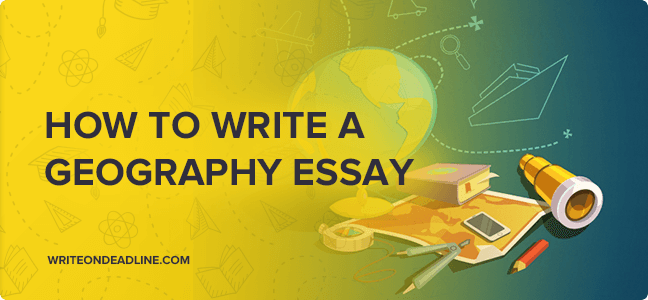
Table of Contents
Introduction to Geography Essays
Importance of essay writing in geography.
Essay writing in geography is crucial as it allows students and researchers to explore complex environmental, physical, and societal issues. It enables the synthesis of empirical data and theoretical frameworks, fostering critical thinking and communication skills.
Brief Overview of Common Types of Geography Essays
Geography essays come in various forms, each serving a different purpose:
- Research Papers: These involve in-depth analysis of geographic phenomena using primary and secondary data.
- Comparative Essays: They examine the similarities and differences between two or more geographic entities.
- Argumentative Essays: These essays present a stance on a geographic issue, supported by evidence and logical reasoning.
Understanding the Essay Question
How to interpret essay prompts.
To correctly interpret essay prompts, one must read the question carefully, noting any specific instructions or scope defined. Break down the prompt to understand what the examiner is asking for.
Identifying Key Terms and Directives
Key terms are the concepts central to the question, while directives are action words like “discuss,” “compare,” or “analyze” that dictate the approach to be taken. Identifying these helps in aligning your essay with the expectations of the question.
Research and Sources
Finding reputable sources for geographic data and theories.
Utilize academic databases, government publications, and verified online resources to gather reliable geographic data and theoretical perspectives. Libraries and academic journals are also invaluable sources.
Evaluating and Citing Sources Properly
Assess the credibility of sources by checking the author’s credentials, publication date, and the publisher’s reputation. Cite sources using the appropriate academic style guide to avoid plagiarism.
Balancing Quantitative Data with Qualitative Insights
Incorporate statistical data to support claims while also providing qualitative observations for a well-rounded argument. This balance ensures a comprehensive exploration of geographic issues.
Planning the Essay
Creating an outline to structure thoughts and research.
An outline serves as a roadmap for your essay. Start with the introduction, then detail each body paragraph’s main idea, and conclude with a summary of your argument and findings.
The Significance of a Thesis Statement
A thesis statement is the centerpiece of your essay. It should clearly express the main argument or claim of your essay and guide the development of your supporting points. It is usually placed at the end of the introduction.
Writing the Essay
Crafting an engaging introduction.
Begin with a hook that captures the reader’s interest. Provide context for your topic, and establish the relevance of the essay. End the introduction with a clear thesis statement that outlines your argument or perspective.
Body Paragraphs
Each paragraph should begin with a topic sentence that introduces the main idea. Build your argument by integrating evidence, data, and geographic models or theories. Ensure each piece of evidence is analyzed and connected back to your thesis.
Concluding Effectively
The conclusion should restate your thesis, summarize the main points of your body paragraphs, and highlight the broader implications of your findings. Avoid introducing new information; instead, close the essay by reflecting on its significance.
Referencing and Bibliography
Overview of citation styles common in geography.
Geography papers commonly use APA or Chicago citation styles. Familiarize yourself with the one required for your essay, as each has specific rules for formatting in-text citations and bibliography entries.
Importance of Avoiding Plagiarism
Always credit the original authors of your sources. Use quotations for direct citations and paraphrase information with proper attribution. Plagiarism undermines your credibility and can have serious academic consequences.
Editing and Proofreading
Strategies for effective editing.
Review your essay multiple times, focusing on different aspects: content, structure, and clarity. Check for coherence in your arguments and the seamless integration of evidence.
Tips for Grammar, Punctuation, and Stylistic Consistency
Use tools like grammar checkers, but also manually review your essay. Pay attention to sentence structure, punctuation, and ensure stylistic consistency throughout the document.
Presentation and Submission
Adhering to format guidelines.
Follow the specified guidelines for font size, margins, spacing, and headers. Consistent formatting contributes to the professionalism and readability of your essay.
Importance of Visual Elements in Geography Essays
Visual elements like maps and graphs are crucial. They should be clear, well-labeled, and referenced in the text. Ensure they are relevant and enhance the reader’s understanding of your argument.
Examples and Resources
Examples of strong thesis statements and well-structured paragraphs.
- Thesis Statement: “The impact of climate change on coastal cities is multifaceted, leading to not only physical changes but also socio-economic challenges.”
- Paragraph Structure: Start with a clear topic sentence, followed by evidence and analysis, and conclude with a sentence that ties back to the essay’s thesis.
List of Resources for Further Support
- Writing Centers: Many educational institutions offer writing support services.
- Online Tools: Grammarly for proofreading, Zotero for managing citations, and Purdue OWL for style guidelines.
- Academic Journals: Access through your institution’s library for examples of scholarly work.
Remember, writing a geography essay is as much about showcasing your knowledge as it is about effective communication. Ensure that each part of your essay works towards clearly presenting your findings and analysis.

Geography Essay Examples and Topics
Advantages and disadvantages of urbanization essay.
- Words: 1552
London as a Global City Essay
Importance of parks in modern cities, winter and summer seasons comparison, global village concept explained, physical geography and its effects on humans, doreen massey’s concept of a global sense of place.
- Words: 2265
Italian Culture
- Words: 1092
Hurricanes Causes and Effects
- Words: 1410
Nairobi National Park in Kenya
- Words: 1088
The UAE Cultural Analysis: Adherence to Traditions, Cultural Beliefs, and Values
- Words: 1924
Geography of United Kingdom
Geography, its evolution and future.
- Words: 1653
Global City Status Issue
- Words: 2274
Norway’s Geography and Economy
- Words: 2263
The Best Place in the World to Live: Personal Opinion
- Words: 1160
Role of Planning Professionals
- Words: 3996
Geography and History in the Classroom
- Words: 1553
Physical, Human, and Economic Geography of Italians
- Words: 1371
Study of Earth Systems
The maps’ importance in human history, easter island natural resources overutilization, personal statement for a major in geography and planning, city of perth, australia exploration.
- Words: 2936
World Geography: Russian and North America’s Climate
Gis data organization: spatial data structure & models.
- Words: 2181
Caves Definition & Characteristics
Climate zones of the united states, deep-sea currents and upwelling along florida.
- Words: 2266
Ethiopia: Historical Background and Modern Issues
Immigration: where did your ancestors live, unesco paper: the grand canyon national park.
- Words: 1732
Mountains Characteristics
How gps locates and finds the user position.
- Words: 1636
How Europe Underdeveloped Africa
- Words: 1159
Polar Ice Caps in Antarctica and the Arctic
The reasons for the four seasons on earth, winter in prince george: the colors of the snow, planet earth: caves documentary, cities in post-modern era.
- Words: 1926
Azerbaijan’s Economic, Political and Social Features
- Words: 6677
Environmental Analysis in the UAE
History and culture of the brazil.
- Words: 1044
The Rocky Mountains as the Best Symbol of Canada
Why are glaciers interesting, demographics: east side ward of newark, new jersey, desert: facts & characteristics, human geography as the study of space and place, major geographic qualities of europe.
- Words: 1814
Miami Geographical Aspects
Marxism in development geography.
- Words: 1695
The Miami Beach
Hokkaido island of japan.
- Words: 2721
Multicultural Influences on Australian Cuisine
Exploring landscapes with google earth.
- Words: 1176
Political Geography: Fast Fashion’s Environmental and Social Impacts
Marine spatial planning of the baltic sea, the republic of nauru’s locally-managed marine area, quartz: corresponding development of science, five themes of geography applied to africa, from earth to oil to modern life, unveiling the evolution of geography.
- Words: 2624
The Discussion of Lansing City
Geography’s role in diving the north from the south, regional analysis of surrey, british columbia, the nunavut region as canada’s last frontier, canadian regional geography in photographs, trinidad and tobago’s sustainability analysis, meteorology, climatology, and atmospheric science, my home: pittsburgh, pennsylvania, studying nature: alexander von humboldt, world’s columbian exposition of chicago, how deep sea discoveries inspires professional creativity, urbanization and suburbanization, chapter 12.6 of economic geography by coe et al., the grand canyon and its potential, environmental anthropology and human survival at the arctic biome.
- Words: 4973
A Baseline Analysis of Blackburn With Darwen
- Words: 2551
Does Mercator Projection Adequately Represent the Real Size of the Country
Saint anne’s hospital neighborhood in fall river, massachusetts, five countries geography: southeast asia.
- Words: 2831
Greece, Country Analysis: Location and Business Issues
- Words: 1262
Atlantic City, the City in the United States
Researching the earthquake, columbus’ letter to luis de sant angel regarding the first voyage, russia: socio-demographic and economic information, most powerful tidal turbine set sail in scotland, information about the usa states’ boundaries, weather analysis for vancouver, british columbia, analyzing differences in development between countries and within countries.
- Words: 2044
Native Dune Systems vs. Man-Made Beach Structures
- Words: 5002
Biodiversity and Dynamics of Mountainous Area Near the House
- Words: 1240
Analysis of China’s Plans for Greenhouse Gas
Campania, italy: geographic analysis, north africa/southwest asia (naswa).
- Words: 1099
How Glacier Mass and Mass Balance Are Linked
Literacy and numeracy in the geography subject area.
- Words: 1996
Coal Energy and Reserves in New Zealand
- Words: 1991
The Effect of Colonization and Dispossession
- Words: 1362
Journal of Cultural Geography Studies
- Words: 1148
Geographical Research: Russian Federation
Cultural geography and politics of jerusalem.
- Words: 1235
Geography of the United States
Data visualization and gis solutions.
- Words: 1168
The Climate in New York, Miami and Chicago
- Words: 1460
The Six Elements of Geography
Maps, atlases and their essential components, city politics: zoning laws, columbus’ voyage to america, the political geography of the united kingdom, spain: brief characteristic of the country, the strait of hormuz choke point, the syrian rebellion causes and overview, water scarcity: industrial projects of countries that affect the external environment, european knowledge of the new world state prior to 1492, landscape eements of today’s infrastructure in europe, european boundary on the eastern part of the continent, physiographic regions of the european continent, brasilia: brief characteristics of the city, water distribution in california.
How to master A Level Geography 20-mark essay questions
- Study Skills

- Share Article

What should I do before attempting an A Level Geography 20-mark essay question?
Should i plan an a level geography 20-mark essay, how should i structure an a level geography 20-mark essay.
As we run up to exam season, many of you will now be completing your NEAs (non-examined assessment) and exam content, and starting to focus on exam technique. You may be thinking about how you will tackle the dreaded 20-mark essay questions . Essay questions are very much like marmite for students. Some love them as they get the chance to explore key geographic theories and showcase their knowledge and understanding, which may not be possible in lower-stakes questions. However, others may struggle to formulate their geographic ideas or structure them in a way that makes a convincing argument.
In my experience, all A Level geography students must be systematic and structured in the way they write their long-form answers. This approach ensures that students cover all the necessary content while also demonstrating the geographic skills that examiners are assessing.
Examiners use both AO1 and AO2 to evaluate students in essay questions. AO1 requires students to demonstrate knowledge and understanding of places, environments, concepts, processes, interactions and change at various scales. AO2 deals with the application of knowledge and understanding in different contexts to interpret, analyse, and evaluate geographical information and issues. The strongest students can produce answers that balance the two aspects in their responses. If you weigh your answers too far toward knowledge recall and simply state facts, figures, and case study knowledge without doing anything with the knowledge (this is where command words are essential), you will not be able to achieve the highest levels described in the level descriptors.
Before you attempt essay questions, I suggest you take a look at the mark schemes for some past paper questions. It is important to focus on the level descriptors as these are what the examiners will use to assess your answers. Pay attention to the language they use to describe what they are looking for, and when you start your attempts, consider whether your language and writing style match the descriptors. The exam board mark schemes are available on the PMT A Level Geography past papers webpage .
Another place to look before attempting essay questions is the assessed sample answers produced by the exam boards (e.g. AQA Paper 1 Hazards Example Responses ). These are available on the exam board websites and show a range of pupil responses to exam questions. They come with a helpful commentary that explains how the pupils gained marks, highlights the importance of a well-structured response, and provides insight into what examiners are looking for when assessing your answers.


Where to start – command words
As mentioned above, it is very important for students to be systematic in their approach to answering 20 markers. The first thing students need to understand is the command word . Without knowledge of what the command word means and what it is asking you to do, you will not be able to fully engage with the question. To find out the meaning of different command words , you should visit your exam board’s website and look in the specification.
Essay questions tend to use the command words “to what extent” or “assess” . According to AQA, if the question includes the “to what extent” command word, you should “Consider several options, ideas or arguments and come to a conclusion about their importance/success/worth”. On the other hand, if it is an “assess” question, you should “use evidence to weigh up the options to determine the relative significance of something. Give balanced consideration to all factors and identify which are the most important.”
BUG the question
Command words can help guide you in how to structure your answers and the skills you need to exhibit. During KS3 and KS4, you may have been told to BUG the question, where B stands for box the command work , U for underline key terms , and G for glance back at the question .
I would encourage all A Level students to continue to use this strategy, even for longer essay questions. It will help ensure that you are answering the question you are being asked, rather than the question you wish you were being asked.
Failure to prepare is preparing to fail.
It is crucial for all students to plan their essay writing before they start answering a question. An essay question requires you to write for a sustained period, and if you don’t have a clear plan for what you’re going to write, you may lose focus on your points and arguments and not fully answer the question.
I suggest that all A Level students write a brief plan before attempting the question . This plan should outline the introduction, including key terms to define and any case studies to introduce, the main argument in each of your paragraphs, and finally, the contents of your conclusion. Spending just five minutes on this will save you time in the long run and help keep you on track to answering the question fully.

Looking for support with your AS Level Geography revision?
Our two-day Geography AS Level May Half-term Revision Course is designed to get Year 12 students up to speed for their end-of-year assessments. Book now and enjoy a 10% discount with the code GEOGBLOG10 .
A good structure is key to success in essay writing. A clear structure enables you to answer the question coherently and reduces the chance that you will lose the key focus of your points. All of the exam boards recommend following the structure outlined below:
Introduction
- Main body of the answer (three to four key arguments)
In academia, this is sometimes known as the hourglass essay . An hourglass essay starts with a big idea, narrows down to a specific question, and then widens back out to explain why that specific question is important in the grand scheme of things.
The introduction of your essay should account for approximately 10% of the total essay length , and it’s an excellent opportunity for you to impress the examiner. Your essay introduction should give a broad view of the essay themes and provide a definition of the key terms that you have underlined in your question. It is also the place to introduce a case study location . A strong start to your essay is crucial as it demonstrates to the examiner that you have a clear understanding of the geographic content you’ve been studying.
Once you have written your introduction, you can then get on to answering the questions. While the introduction mainly covers AO1 (knowledge and understanding of geography), the main body of your answer should cover both AO1 and AO2 (analysis and evaluation in the application of knowledge and understanding).
As before, the way you structure the main body of your answer is very important, and you must form your points clearly and coherently. During my teaching and tutoring, I have seen many ways of forming these arguments/points, but the two most effective methods I have seen are using PEEL or PEACE paragraphs .
- E xplanation
- A pplication

Everyone is different, and everyone has their unique writing style. My advice to all A Level students is to try both methods when beginning to tackle essay questions and determine which one works best for you. I would also recommend completing PEEL/PEACE paragraphs and asking for feedback from your teacher or tutor.
The main body of the essay should consist of three to four arguments that cover the views for the specific question. Those who can link back to the question but also between their paragraphs will have the best chance of performing well in their essay questions.
After completing the main body, you now need to finish your essay with a conclusion. Just like the introduction, this should be roughly 10% of the total essay length . The main aim of the conclusion is to bring your essay to a close and essentially answer the question you have been asked. In the conclusion, you should summarise your argument and avoid introducing any new information . It is simply a chance to express your own thoughts and opinions while bringing your essay to a close.
The quality of a conclusion is often a key indicator of the overall quality of an essay. Although it is a short section of the whole piece of writing, it provides a platform to showcase several important geographic skills such as analysis, summarising, and creating synoptic links .
Overall, it is very important that you give yourself enough time to complete your essay questions during your examinations and that you follow the structures discussed above. If you follow these guidelines, you will see an improvement in the quality of your essay responses.
If you’re in Year 13 and in need of additional help, PMT Education runs Geography A Level Easter Crash Courses for AQA and Edexcel . Whether you need support with exam technique or want to revise key sections of the syllabus with the help of an experienced tutor, these courses will equip you with the knowledge, skills, and confidence to excel in your summer exams.

Dave is a qualified teacher with 10 years of experience teaching GCSE and A Level Geography. He has worked as an assistant faculty leader for Humanities and a professional mentor for new and trainee teachers. He has also been involved with the supervision and guidance of NEAs. Dave currently works in higher education and trains geography teachers across the North West of England. He is also a tutor at PMT Education , with experience running highly successful geography courses.
Recent Posts

How to manage exam anxiety
Exams can be nerve-wracking, but with the right strategies, you can manage your anxiety and boost your performance. From deep breathing techniques to strategic exam approaches, this article offers tried and tested tips to help you stay calm and focused before, during, and after your exams. You've got this!

Helping your child the night before an exam: A parent's guide
Ease your child's pre-exam nerves and set them up for success with this essential guide. From managing pre-exam anxiety to packing the right materials, discover how to create a calm and supportive environment the night before an exam. Help your child walk into their exams confident and prepared!

How to build a positive classroom culture
Discover how to build a positive classroom culture with insights from a Senior Leader in Teaching and Learning. Learn effective strategies for fostering inclusivity, respect, and positivity. From establishing shared goals to promoting a mistake-friendly environment, create a mini community that thrives on mutual support and growth.
Search by Topic
- Behaviour (1)
- Diversity (1)
- Finances (4)
- Inspection and Observation (2)
- Leadership (1)
- Pedagogy (13)
- Planning and Organisation (3)
- Post-16 Options (7)
- Revision and Exams (13)
- Science Teaching (3)
- SEND Teaching (2)
- Study Skills (9)
- Tuition (7)
- University (11)
- Wellbeing (13)
Related Posts

Tackling explanation questions in A Level Physics
Written by an expert tutor, this comprehensive guide will teach you how to tackle challenging explanation questions in A Level Physics. Understand the nuances of application questions and learn how to craft well-reasoned responses. Master the step-by-step process and go into your A Level Physics exams with confidence!

Alternatives to A Levels: Vocational qualifications
A Levels aren't right for every student. From BTECs to NVQs, T Levels and apprenticeships, explore the world of post-16 vocational qualifications. Learn about the courses, skills, and career prospects associated with each qualification, and discover the right route for your interests and career aspirations.
Join Our Community
Sign up to our monthly newsletter to be kept in the loop about new resources, blogs and more.
Our ambition is to guide students from secondary school into their adult life.
- Uni Admissions
- Bursary Scheme
- For Schools
- Revision Resources
- Computer Science
- Find a Tutor
- How it Works
- Teacher Resources
- Information
- Privacy Policy
- Terms and Conditions
- Safeguarding Policies

- Customer Reviews
- Extended Essays
- IB Internal Assessment
- Theory of Knowledge
- Literature Review
- Dissertations
- Essay Writing
- Research Writing
- Assignment Help
- Capstone Projects
- College Application
- Online Class
Geography Extended Essay: Definition, Rubric, And Topics for IB
by Antony W
July 18, 2022

The IB program requires you to write a 4,000-word extended essay on any subject of your choice. So if you’ve picked Geography as your focus area, you’ll find this guide incredibly helpful.
This guide to Geography extended essay covers the following:
- Choice of topic
- Treatment of your selected topic and
- The assessment criteria
What’s Geography Extended Essay?
An extended essay in Geography provide students the opportunity to employ a wide variety of abilities and develops an original and in-depth geographic investigation. Spatial focus as well as the application of geographical theories characterize the length of this assignment.
Choosing a Geography Extended Essay Topic
One thing you have to get right before you start writing an extended essay in Geography is topic selection.
1. Pick a Narrow, Focused Topic
The topic you choose should have a geographical focus because you’ll have to ensure the research topic guides you down a route that uses acceptable geographical materials and fosters the application of pertinent geographical concepts, theories, or ideas.
To be abundantly clear, the topic you choose should not be excessively broad because essays written on broad topics are rarely successful.
Make your topic narrowly targeted to promote in-depth investigation as opposed to a broad one. Additionally, it is essential that you establish the geographical background of the essay early on.
2. Base Your Topic on Local Research
Investigations conducted on a local basis often receive the best grades. This restricted emphasis discourages an excessive dependence on existing information and promotes original research.
Extended essays written on topics known and accessible to the student have a larger probability of success due to the student’s stronger personal connection, which stimulates more in-depth research.
3. Choose a Topic that Encourages Original Research
The cornerstone of a successful geography extended essay is a robust technique that includes the collecting of high-quality facts.
Good data allows the IB learner to conduct the sort of in-depth examination that distinguishes the finest works. It’s unlikely that an essay relying solely on published textbooks will receive a high grade.
How to Treat Your Geography EE Topic
You don’t want to view a geography extended essay as merely an extended piece of fieldwork.
Although there may be parallels in technique, the extended essay doesn’t have to lay a heavy focus on original field data. In other words, you can rely on already existing research ideas on previously published data to get the work done.
When researching the topic you’ve selected, pay more attention on written analysis, interpretation, and assessment, as well as the development of an argument rather than data collection and processing procedures.
Supporting Your Geography Extended Essay
A geography extended essay must include proper ways for showing information or data. You should include diagrams, sketch maps, tables, and graphs, making sure you acknowledge their origin if you draw them from other sources.
We strongly recommend the use of maps at the beginning to provide a clear geographical backdrop for the inquiry. Every map must provide an indication of direction and size, as well as a key.
- As supporting data, the usage of sketch maps and labeled or annotated diagrams is strongly encouraged.
- You can use computer-generated maps provided you identify the computer software used.
- Hand-drawn maps should be neat and legible, with appropriate use of color shading, a scale, and a key.
- If you include photographs in your work, make sure they’re integral to the text and not just decorative.
IB Geography Extended Essay Assessment Criteria Explained
The following is the assessment criteria used for the extended essay in Geography:
Criterion A: Research Question
The research question must be specific, relevant to the topic of geography, provide a geographical context for the essay, and inspire an inquisitive approach.
Many effective essays in geography explore the research issue through the formation of one or more hypotheses. If you include a hypothesis in your work, make sure it’s well constructed, testable, grounded in geographical theory, and incorporate proper investigation channels.
Criterion B: Introduction
It is essential to contextualize the study issue geographically and theoretically. Therefore, the introduction should define the scope and location of the inquiry and illustrate the relevance of the issue to existing geographical knowledge and theory.
There should be an explanation of why you chose the issue and why it merits examination. The introduction of the essay should be simple and straightforward.
Criterion C: Investigation
It is essential that the inquiry utilize a variety of data sources, including those specified in the “Treatment of the issue” section. The materials you pick for the essay must be pertinent to the subject and give the evidence that will support your argument.
The essay must employ adequate qualitative and quantitative data and/or information. For instance, questionnaires must have enough respondents for the results to be reliable.
Adopting a technique that begins with the gathering and selection of relevant material leads to a methodical analysis with legitimate results, interpretation, and conclusions, and concludes with a critical review of the evidence and the strategy used is the correct essay planning.
Criterion D: Knowledge of the Topic
A successful essay requires knowledge and comprehension of the theoretical basis and an awareness of the academic setting.
Using both primary and secondary sources , you should integrate their own ideas with current geographical theory to accomplish this.
Criterion E: Reasoned Argument
The argument can be personal, but it must also be rational and well balanced. By using proper maps, diagrams, drawings, pictures, and charts/graphs, you can convey evidence in graphical as well as textual format.
If and where applicable, the argument you present should give evidence that leads to the acceptance or rejection of the initial hypothesis. Avoid prejudice in the context of an issue, dispute, or problem inquiry.
Criterion F: Application Analysis & Skill Evaluation
The majority of the evidence supplied to support an argument in a geography extended essay comes from data analysis. This necessitates the application of proper analytical procedures and tests of significance.
The use of interaction and gravity models, network analysis, correlation techniques, dispersion measurements, sampling procedures, and standard error estimates are among the legitimate tools distinctive of geographical investigation.
When analyzing qualitative data, you must employ the right analytic procedures. Your research should demonstrate an understanding of the data’s legitimacy, validity, and limits, as well as the methodologies employed.
It is possible that the outcomes of the study are surprising or do not appear to conform to prevailing trends. This might lead to the absence of data. Even if that’s the case, the essay must nonetheless include a critical examination and evaluation of the material presented.
Criterion G: Language Selection
This criterion examines whether you’ve utilized Geographical terminology and language correctly and consistently throughout the essay.
It is essential to adopt a style that is impartial, avoids long personal assertions and viewpoints, and conveys geographical facts and concepts clearly and precisely.
Criterion H: Conclusion
The conclusion should include a summary of the investigation’s conclusions and quickly recap the pertinent evidence. If and where applicable, you should indicate which hypotheses have been accepted or rejected – and give an explanation.
The conclusion of your essay should examine the adequacy of the approach and identify any defects or constraints in the investigational procedure.
The conclusion should not be an emotional personal remark about a topic, dispute, or problem, nor should it bring new facts not presented throughout the argument.
Criterion I: Formal Presentation
This criterion addresses the extent to which the essay complies with academic norms about the format of research papers. It is inappropriate to offer an essay without a bibliography or citations.
Essays that remove one of the required extended essay outline get a rating of no higher than good, and those that omit two of them get a rating of subpar.
All graphic material mentioned in the body of the article (maps, pictures, field drawings, charts, and so forth) should be at the appropriate locations, not at the conclusion or in appendices. It should be well organized and utilized to complement the textual material and clarify explanations.
Big data tables, published large maps, transcripts of interviews, and lengthy series of computations go to the appendices. It is not necessary to add field notes as an appendix, but you can include at least one completed questionnaire form.
You need to cite source of any data, diagrams, graphs, charts, tables, and pictures where feasible.
Criterion J: Abstract
The abstract should clearly express the research topic, describe how you conducted the study, the techniques employed, and the types of data collected.
Also, it should provide a concise summary of the findings as stated in the conclusion.
Criterion K: Holistic Judgement
For holistic judgment, you need to make sure your Geography extended essay reflects the following characteristics:
- Intellectual initiative: You can demonstrate this by creating a hard research subject, applying unique or imaginative techniques of data collecting and data analysis, and generating an original work.
- Understand the topic’s theoretical context and maintain it as the focus of the inquiry.
- Utilize introspection in the construction of your argument and assessment of your writing.
- Pick and employ inventive illustrative ways
- Overcome difficulties that emerge
- Modify views based on fresh facts.
About the author
Antony W is a professional writer and coach at Help for Assessment. He spends countless hours every day researching and writing great content filled with expert advice on how to write engaging essays, research papers, and assignments.
- How It Works
- PhD thesis writing
- Master thesis writing
- Bachelor thesis writing
- Dissertation writing service
- Dissertation abstract writing
- Thesis proposal writing
- Thesis editing service
- Thesis proofreading service
- Thesis formatting service
- Coursework writing service
- Research paper writing service
- Architecture thesis writing
- Computer science thesis writing
- Engineering thesis writing
- History thesis writing
- MBA thesis writing
- Nursing dissertation writing
- Psychology dissertation writing
- Sociology thesis writing
- Statistics dissertation writing
- Buy dissertation online
- Write my dissertation
- Cheap thesis
- Cheap dissertation
- Custom dissertation
- Dissertation help
- Pay for thesis
- Pay for dissertation
- Senior thesis
- Write my thesis
146 Impressive Geography Research Topics Every Student Will Like
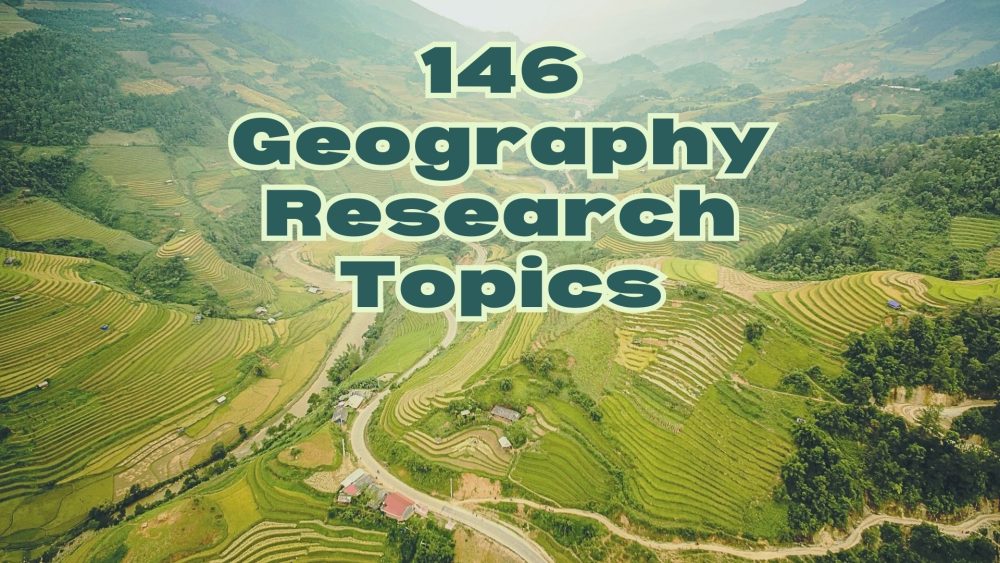
Are you a student seeking inspiration for your next geography research project? Look no further! In this article, we present you with a treasure trove of 146 original and top-quality geography research topics, completely free of charge. Whether you’re pursuing a degree in geography or simply passionate about exploring the world around you, these topics cover a wide range of fascinating subjects.
From human geography and cultural landscapes to physical geography and environmental sustainability, we’ve got you covered. Each topic is carefully crafted to ignite your curiosity and help you delve deeper into the field. Get ready to embark on an exciting journey of exploration and discovery as you uncover unique research ideas that will captivate both you and your readers.
Areas Of Geography
Geography is a field of study that explores the Earth’s physical features, human activities and their interactions. It examines the spatial patterns, processes, and relationships between the environment and society. Geographers investigate the Earth’s surface, analyzing its landscapes, climate, ecosystems and resources, as well as the distribution of populations, cultures, economies, and political systems. There are several types of geography, each focusing on specific aspects of the Earth’s physical and human dimensions:
Physical geography examines natural phenomena like landforms, weather and ecosystems. Human geography studies human activities, such as population distribution, urbanization and cultural landscapes. Economic geography explores the spatial patterns of economic activities, trade and resource distribution. Political geography analyzes the political systems, boundaries and geopolitical relationships between regions. Environmental geography investigates the interactions between humans and the environment, including environmental issues and sustainability. Geographical information systems (GIS) and remote sensing employ technology to analyze spatial data and maps.
These subfields together provide a comprehensive understanding of the Earth’s complexities and its relationship with human society.
Easy Geography Research Paper Topics
Want to write your paper in just a couple of hours? Explore a curated list of accessible and easy geography research paper topics that will make your geography research paper writing a breeze:
- The impact of climate change on coastal regions
- Exploring the relationship between geography and tourism
- Analyzing urbanization trends in developing countries
- Investigating the effects of deforestation on biodiversity
- Examining the role of geography in natural disaster management
- Studying the cultural landscape of a specific region
- Analyzing the geography of food production and distribution
- Exploring the impact of transportation on urban development
- Investigating the geography of renewable energy sources
- Analyzing the spatial patterns of population growth
- Studying the impact of globalization on local economies
- Examining the geography of water resources and management
Human Geography Research Topics
Improve your chances of getting a top grade! Delve into the complex interplay between humans and their environment with this comprehensive list of human geography research topics:
- Exploring the social implications of gentrification in urban areas
- Analyzing the influence of gender on migration patterns
- Investigating the impact of globalization on cultural identity
- Examining the geography of poverty and social inequality
- Studying the relationship between health and geographical location
- Analyzing the spatial distribution of ethnic communities in cities
- Investigating the geography of political power and governance
- Exploring the role of geography in shaping human behavior
- Analyzing the impacts of urban sprawl on communities
- Studying the geography of education access and quality
- Examining the spatial patterns of crime and its socio-economic factors
- Investigating the geography of healthcare provision and disparities
Cultural Geography Research Topics
Interested in cultural geography? Immerse yourself in the rich tapestry of cultures and their geographical influences with this captivating list of cultural geography research topics:
- Analyzing the cultural landscapes of indigenous communities
- Exploring the impact of globalization on cultural diversity
- Investigating the geography of language and its preservation
- Examining the influence of religion on cultural landscapes
- Studying the role of cultural heritage in tourism development
- Analyzing the geography of cultural festivals and events
- Investigating the spatial patterns of cultural diffusion
- Exploring the impact of migration on cultural identities
- Analyzing the geography of music and its regional variations
- Investigating the role of food culture in shaping identities
- Examining the spatial distribution of cultural institutions
- Studying the geography of art and its impact on communities
Physical Geography Research Topics
Do you want to write about physical geography? Investigate the natural processes and phenomena shaping our planet through this collection of compelling physical geography research topics:
- Analyzing the processes of coastal erosion and their impacts
- Investigating the formation and characteristics of river systems
- Examining the effects of climate change on glacial landscapes
- Analyzing the spatial patterns of soil erosion and conservation
- Investigating the biogeography of specific ecosystems
- Exploring the impacts of climate on vegetation patterns
- Analyzing the geography of water resources and hydrology
- Investigating the formation and classification of landforms
- Examining the spatial distribution of biodiversity hotspots
- Studying the interactions between humans and the natural environment
- Exploring the impacts of urbanization on natural landscapes
Geography Thesis Topics
Are you busy planning your thesis? Engage in an in-depth exploration of geographic concepts and theories with this thought-provoking list of geography thesis topics:
- Investigating the geographical aspects of sustainable development
- Analyzing the impacts of climate change on vulnerable communities
- Exploring the role of geography in disaster risk reduction
- Studying the geography of migration and refugee movements
- Examining the relationship between urban planning and social equity
- Analyzing the spatial patterns of energy consumption and renewable solutions
- Exploring the geographical dimensions of political conflicts and peacebuilding
- Investigating the role of geography in land use planning and conservation
- Examining the impacts of globalization on local economies
Urban Geography Thesis Topics
Are you interested in writing about urban geography? Analyze the complexities of urban landscapes and urbanization processes with this curated selection of urban geography thesis topics:
- Analyzing the effects of gentrification on urban neighborhoods
- Investigating the role of urban design in creating sustainable cities
- Examining the spatial patterns of urban sprawl and its consequences
- Studying the geography of social segregation in urban areas
- Analyzing the impacts of transportation systems on urban mobility
- Investigating the relationship between urbanization and public health
- Exploring the geography of informal settlements and slums
- Analyzing the impacts of urban green spaces on quality of life
- Investigating the geography of urban food systems and food security
- Examining the role of technology in shaping smart cities
- Studying the spatial distribution of cultural and recreational amenities in cities
PhD Research Topics In Geography
Expand the boundaries of geographical knowledge and contribute to the field with this diverse and stimulating list of PhD research topics in geography:
- Analyzing the geography of environmental justice in urban areas
- Investigating the impacts of climate change on indigenous communities
- Examining the role of geography in disaster risk governance
- Studying the spatial patterns of land use change in rapidly urbanizing regions
- Analyzing the impacts of transportation infrastructure on accessibility and equity
- Investigating the geographical dimensions of health inequalities
- Exploring the relationship between globalization and urbanization processes
- Analyzing the geography of political conflicts and territorial disputes
- Investigating the impacts of natural resource extraction on local communities
- Studying the spatial dynamics of international migration and its consequences
- Exploring the geography of innovation and knowledge economies in cities
Captivating Research Topics In Geography
Looking for some captivating research topics in geography? Ignite curiosity and scholarly interest with this awesome collection of research topics that delve into various aspects of geography:
- Investigating the geography of mega-cities and their challenges
- Analyzing the impacts of climate change on vulnerable coastal regions
- Exploring the spatial patterns of cultural landscapes and heritage sites
- Studying the geography of borderlands and transnational interactions
- Examining the impacts of tourism on local communities and environments
- The role of geography in understanding human-environment interactions
- Analyzing the spatial distribution of environmental pollution and its impacts
- Exploring the geography of global food systems and agricultural practices
- Investigating the impacts of natural disasters on urban resilience
- Examining the role of geography in understanding urban inequalities
- Studying the geography of geopolitical conflicts and their implications
- Exploring the impacts of technological advancements on landscapes
Interesting Geography Research Topics
Discover a wide range of interesting geography research topics that will pique your professor’s curiosity and offer new insights into the world of geography:
- Analyzing the impacts of climate change on glacier retreat and water resources
- Investigating the geography of renewable energy transition and its challenges
- Examining the spatial patterns of urban heat islands and their mitigation strategies
- Studying the impacts of land use change on biodiversity conservation
- Investigating the role of geography in understanding cultural diversity
- Exploring the geography of disease outbreaks and their spatial spread
- Investigating the impacts of natural hazards on human vulnerability and resilience
- Examining the spatial distribution of ecological corridors
- Studying the geography of regional economic disparities and development strategies
- Exploring the impacts of transportation infrastructure on urban accessibility
- The role of geography in understanding weather patterns
Good Geography Research Topics For 2023
Looking for some current topics to write about? Choose from a list of good geography research topics for 2023 that showcase the relevance and significance of geography in today’s world:
- Impacts of population growth on urban infrastructure and services in geography
- Geography of water scarcity and its implications for communities
- Spatial patterns of environmental conservation and protected areas in geography
- Impacts of land degradation on agricultural productivity and food security
- Geography of natural resource management and sustainable practices
- Relationship between climate change and human migration patterns in geography
- Spatial distribution of environmental justice and marginalized communities
- Impacts of urbanization on water pollution and ecosystem degradation
- Geography of renewable energy sources and their integration into the grid
- Role of geography in understanding regional conflicts over natural resources
- Impacts of deforestation on biodiversity loss and ecosystem services
Geography Topics For Research For College
Need some great geography topics for research for college? Explore a comprehensive list of geography research topics tailored for college-level studies, offering opportunities for critical analysis and exploration:
- Impacts of transportation infrastructure on urban air quality in geography
- Geography of urban gentrification and displacement
- Spatial patterns of urban food waste and its environmental consequences
- Impacts of tourism development on fragile ecosystems in geography
- Geography of environmental migration and its social implications
- Role of geography in understanding climate adaptation strategies
- Spatial distribution of environmental inequalities and environmental racism
- Impacts of land use change on water quality in agricultural regions
- Geography of geopolitical conflicts and territorial disputes
- Impacts of industrial pollution on urban health and well-being
- Role of geography in understanding disaster preparedness
Interesting Geography Topics For High School
Get the most interesting geography topics for high school. Foster geographical curiosity and critical thinking skills with this intriguing list of essay topics designed specifically by our best dissertation service writers for high school students:
- Analyzing the impacts of climate change on the polar regions
- Investigating the geography of natural hazards
- Examining the spatial distribution of endangered species
- Studying the impacts of urbanization on wildlife habitat fragmentation
- Exploring the geography of cultural diversity and multiculturalism in cities
- Investigating the role of geography in understanding climate variability
- Analyzing the spatial patterns of population distribution and density
- Investigating the geography of international migration and refugee flows
- Examining the impacts of tourism on local communities and cultures
- Studying the geography of natural resources
- Exploring the role of geography in understanding global inequality
Engaging Geographical Research Topics
Embark on a captivating journey of geographical exploration with this diverse collection of engaging geographical research topics, connecting people, places and the environment through insightful investigations:
- Urban sprawl impacts on land use and ecosystem services in geography
- Geography of renewable energy transition and its challenges
- Spatial patterns of urban heat islands and impacts on residents
- Impacts of climate change on coastal erosion and shoreline management
- Geography of water scarcity and implications for human populations
- Role of geography in understanding geopolitical conflicts and peacebuilding
- Spatial distribution of environmental pollutants and health effects
- Impacts of globalization on local economies and cultural landscapes
- Geography of gender inequalities and spatial dimensions
- Impacts of natural disasters on vulnerable communities and recovery
- Role of geography in understanding migration dynamics and urbanization
- Geography of political borders and their social and economic implications
Affordable Thesis Help You Can Rely On
When it comes to working on a geography research paper or a thesis for Master’s degree , our company is your trusted source for comprehensive writing help. Our team of expert writers consists of experienced professionals who specialize in geography, ensuring that you receive top marks for your school or class. We pride ourselves on delivering high quality and impressive custom written theses tailored to your specific requirements.
With our secure and fast online service, you can access thesis help that is not only affordable but available 24/7. Rest assured that your work will be handled by native English-speaking experts (ENL writers), guaranteeing exceptional quality and adherence to academic standards. Trust us for all your thesis needs and achieve academic success with ease.
Make sure to check our posts with other topics before you leave:
- 122 Best Ecology Topics To Sparkle Your Writing
- 195 Top Anthropology Topics For Great Thesis
- 170 Fantastic Astronomy Topics For High Scoring Tests
Why is choosing a great topic important when writing a geography essay?
Choosing a great topic ensures that your essay is engaging, relevant, and allows you to demonstrate your understanding of key geographical concepts while capturing the reader’s interest.
How can I choose a great topic for my geography essay?
To choose a great topic, consider current geographical issues, areas of personal interest and the availability of reliable sources. Additionally, ensure that the topic aligns with your essay’s objectives and requirements.
What are some strategies for narrowing down a geography essay topic?
To narrow down your topic, focus on specific geographical regions, phenomena, or concepts. Consider exploring the intersections between different aspects of geography, such as human and physical geography, to create a unique and well-rounded essay topic.
Can I get assistance in choosing a great topic for my geography essay?
Yes, you can seek guidance from your instructor, consult reputable academic resources or utilize online platforms that provide topic suggestions. Engaging in discussions with peers or experts in the field can also help generate ideas and refine your topic choice.

Leave a Reply Cancel reply
Your email address will not be published. Required fields are marked *
Comment * Error message
Name * Error message
Email * Error message
Save my name, email, and website in this browser for the next time I comment.
As Putin continues killing civilians, bombing kindergartens, and threatening WWIII, Ukraine fights for the world's peaceful future.
Ukraine Live Updates
![geography subject essay Information technology in a Global Society Extended Essay [ITGS EE Structure 2022]](https://esquirewritings.org/blog/wp-content/uploads/2022/08/thought-catalog-505eectW54k-unsplash-1024x683.jpg)
50 Geography Extended Essay Topics
Geography EE should be an inquiry into a subject of personal interest that strongly connects to Geography.
Additionally, your research question and conclusion should reveal some personal connection to you to outperform the accent. Therefore, bear that in mind.
Table of Contents
Finding a topic for your geography extended essay. 1
Geography Extended Essay Example (Tourism). 2
Geography Extended Essay (EE) Topics if you live in a Big City. 2
Geography Extended Essay (EE) Topics if you live in a Small City. 3
50 Geography Extended Essay Topics. 3
Finding a topic for your geography extended essay
• Choose something you are genuinely interested in
• Has a strong focus on geography
• Focused topic
The best investigations are typically those that are done locally. This specific approach promotes original research while discouraging an over-reliance on published sources.
You could also choose a topic that allows you to get a lot of primary data and one that you can create a hypothesis for. For instance you can select a topic on investigating and comparing the quality of life in different areas and you can link that to social injustices and issues people face.
Students write essays in subjects they are familiar with and have quick access to have a significantly higher likelihood of success due to a greater degree of personal involvement, which in turn promotes more in-depth research.
A good geography essay’s methodology, which includes gathering reliable data, is its cornerstone. Good data allows the student to do an in-depth study that distinguishes the best works. A fully published textbook-based essay does not often receive a high grade.
An extended geography essay should not be viewed as simply an extended piece of fieldwork. The extended essay does not necessarily need to place such a significant emphasis on primary field data, despite possible similarities in methodology.
In reality, published data is the foundation for many popular research topics. Thus, rather than data gathering and processing methods, the emphasis should be more on written analysis, interpretation, evaluation, and the formulation of an argument.
The methodology of the essay must be specific to the research subject and enable a thorough investigation.

For an extended essay in geography, appropriate sources could include both primary and secondary information, such as books, newspapers and magazines, interviews, the internet, maps, aerial photography and satellite images, digital landscape simulations, video, CD, DVD, GIS, diagrams, and models.
The geographical setting in which the research is being performed should be clearly described, typically using one or more maps and, where appropriate, pictures or satellite images.
Unless it is adequately analyzed using relevant geographic, statistical, graphical, or qualitative methodologies, geographic data is of limited use.
Geography Extended Essay Example (Tourism)
Let’s assume you select tourism (ecotourism) as your topic. I’d advice that you start your topic question with ‘to what extent…’ or ‘discuss’ as starting with these statements can be an indicator of independent thinking.
You can compare different areas and this gives you the opportunity to collect lots of data. Also, try and find a few samples on your topic and see what made those essays get more marks.
Geography Extended Essay (EE) Topics if you live in a Big City
If you live in a big city with a public transportation network, you could investigate the impacts on transportation in general, usage numbers, etc. Such an investigation will be fun and could score well if you do it right.
- Urban planning
- Gentrification
- Urban renewal
- Resilient cities
Geography Extended Essay (EE) Topics if you live in a Small City
- Vegetation type
- The causes of vandalism in Eindhoven : what socio-economic factors and types of urban design lead to high rates of vandalism in Eindhoven’s neighbourhoods? (2012)
- To what extent is biodiversity being managed successfully at Braunton Burrows? (2012)
- Has the recent development of integrated resort, Resort World Singapore, moved Sentosa Island past the stage of stagnation into the stage of rejuvenation or decline according to Butler’s (1980) Tourist Area Life Cycle model? (2013)
- The fertility rate and policies in Singapore (2011)
- How does the quality of life of Filipina Foreign Domestic Workers in the Downtown region of Singapore compare to the Philippines? (2015)
- Is there a relationship between location in the north and south of Mexico and the number of migrants moving to the United States of America, specifically taking into account indices of education, health and income? (2009)
- An investigation into the degree to which Hamburg can be considered a Sustainable Community (2009)
- An investigation into whether or not Singapore can be considered a sustainable city (2015)
- Is Singapore the “Harmonious home” Goh Chok Tong deemed it to be in 2012? (2015)
- To what extent is the Township of Langley’s corporate waste management program effective, demonstrating environmental sustainability? (2014)
- To what extent does the education and employment of women affect Singapore’s fertility rate? (2013)
- To what extent do gender, educational attainment, and working parameters influence obesity risk? – An investigation of the workforce in the Singapore Central Business District (2013)
- To what extent do the migration patterns and motives within the region of the north of Thailand conform with expected migrational movements in an LEDC? (2011)
- To what extent has urban development affected human thermal comfort levels in Singapore? (2012)
- To what extent are there differences between the observed and desired fertility in Singapore and what are the factors that may influence this difference? (2017)
- Comparative study of availability of public services in districts of Warsaw (2021)
- Describe the geography of Liechtenstein.
- How does Indonesia’s volcanic activity affect the country?
- Why is Canada’s landscape so diverse?
- Compare the various climate zones in Russia.
- How does the Sahara Desert influence the African climate?
- Describe the climate in Chad.
- Investigate how wind turbines impact Germany’s environment.
- Compare the agriculture in the state of Georgia and Georgia, the country.
- Explain the peculiarities of the Bermuda Triangle.
- Examine the type of flora found in Greece.
- Explain the geographical features of Socotra Island.
- Human Geography Topics
- Examine the role of humans in animal extinction.
- What currently drives the economic change in the US?
- What does the Nigerian economic landscape look like?
- What determines the norms of social behavior in public spaces?
- Compare the distribution of religious groups in urban vs. rural areas.
- Explore the link between poor education and crime.
- Examine the consequences of urbanization.
- What makes a place exceptionally livable?
- How did the settlement pattern in Asia change over time?
- Cultural Geography Topics
- Explain how your home country shapes your identity.
- Explore how cultural techniques vary from country to country.
- Role of geological evidence in inspiring Darwin’s theory on the origin of species
- Extensive coral bleaching across the Great Barrier Reef resulting from climate change
- Response of the Caribbean ecosystem following the Deepwater Horizon oil spill
- Salt accumulation in soil resulting from unsustainable irrigation practices
- Anticipated climate change impact on oceanic currents
- Massive power outages caused by solar storms – future prevention strategies
- Massive eruption of the Vesuvius supervolcano as the potential cause of Neanderthal extinction
- Polar vortex instability resulting from climate change
- Siberian permafrost thawing – current estimates of methane volume risking to be released and potential implications (according to models)
- Impact of fertilizers on the ecosystem of the Mississippi river
- What does the term “cultural turn” mean?
- Describe the most remarkable societal change in your community.
- What are the reasons for the rise of nationalism in 20th century Europe?
- What are the goals of feminist geography?
- Analyze how a matriarchal society works.
Leave a Comment Cancel Reply
Your email address will not be published. Required fields are marked *
Save my name, email, and website in this browser for the next time I comment.

IB Extended Essay Topics: Geography

As a seasoned IB writer, I’ve had the pleasure and challenge of walking the complex terrain of the IB Diploma Programme (DP), particularly when it comes to writing a compelling Geography Extended Essay. Surprisingly, the very first problem many students face is choosing an appropriate topic and research question. Drawing from my experience, I aim to guide you through this choice with insights and advice to make your writing process smoother, more engaging, and more rewarding.
Understanding the IB DP Geography Extended Essay
First, let’s discuss what the IB DP Geography Extended Essay entails. This demanding yet fascinating task invites you to dig into a topic of your choice within the expansive and multifaceted world of geography. It’s an unparalleled chance to conduct a deep investigation into an area that piques your interest and holds significant academic value. From my perspective, crafting an exceptional essay involves selecting a topic that meets the rigorous IB criteria and ignites your passion. Your genuine enthusiasm for the subject is a beacon that illuminates your research, compellingly drawing the reader into your analytical path.
The Geography Extended Essay’s ability to intertwine scientific investigation with cultural understanding makes it stand out. It offers a platform where quantitative data meets qualitative insights. This blend provides a rich tapestry for exploration, allowing students to showcase their ability to research complex topics with precision and empathy. Here are a few reasons why choosing the right topic is crucial:
- Ensuring your topic aligns with the IB’s expectations is paramount. This alignment guarantees that your essay meets the fundamental requirements, paving the way for a successful evaluation.
- A topic that resonates with you will make the research process more enjoyable and engaging. Passion about your subject shows in the depth and quality of your analysis.
- Choosing a unique angle or a current issue can make your essay stand out. Topics that offer fresh perspectives or address timely questions are often more compelling and impactful.
- The best topics allow for deep analytical thinking. Look for areas where you can apply geographical theories and concepts to real-world scenarios.
In light of these considerations, choosing the perfect topic becomes integral to the extended essay-writing process. It requires careful thought, creativity, and strategic planning.
Exciting Areas of Study in IB DP Geography
As diverse and expansive as the earth’s landscapes, geography as a discipline is a goldmine of fascinating topics ripe for exploration. Within its broad scope, you can move from the Arctic’s melting ice caps to the megacities’ bustling streets. Among its many fascinating branches, environmental and urban geography stand out for their relevance to our world today and their ability to generate deep, original research and insightful analysis. Here are some other compelling areas within IB DP Geography that offer rich avenues for exploration.

Cultural Geography
This area examines cultural practices, norms, and products and their relationships with the places and spaces where they originate. It invites deep research into the diversity of human cultures and their expressions worldwide.
Political Geography
An investigation into the spatial distribution of political processes and systems, including the study of boundaries, territories, and the geopolitics of resource distribution. This field provides insights into the complex interplay between geography and political power.
Economic Geography
This area focuses on how economies are spatially and environmentally distributed and how they influence global, regional, and local economic activities. It touches on topics such as globalization, trade, and economic development.
Physical Geography
This branch examines the natural processes and features of the Earth, including the study of landforms, climates, and vegetation and how these elements interact. It provides a foundational understanding of the physical world that we inhabit.
GIS and Remote Sensing
With the advent of technology, the ability to analyze spatial data through Geographical Information Systems (GIS) and observe the Earth through remote sensing has opened new geographic frontiers. These tools allow for the sophisticated analysis and visualization of geographical data, offering insights into various spatial phenomena.
IB Geography Extended Essay Topics and Research Questions
Below, I’ll share some topic ideas and research questions that could guide your exploration:
- The Impact of Climate Change on Coral Reefs . How is climate change affecting coral reef ecosystems in the Great Barrier Reef?
- Urbanization and Its Effects on Local Climate . How does urbanization influence microclimate conditions in major cities?
- Renewable Energy Sources and Geographic Potential . What is the potential for solar energy in Sub-Saharan Africa based on geographic and climatic conditions?
- Water Scarcity and Conflict in the Middle East . How does water scarcity contribute to geopolitical tensions in the Middle East?
- Effects of Tourism on Natural Landscapes . How does tourism impact erosion and natural landscapes in the Himalayas?
- Sustainable Agriculture Practices in Arid Regions . How do sustainable agricultural practices improve food security in arid regions?
- Economic Geography of the Coffee Trade . How does the global coffee trade impact Colombia’s economic conditions?
- Deforestation and Biodiversity Loss in the Amazon . What are the effects of deforestation on biodiversity in the Amazon Rainforest?
- Geopolitical Implications of Arctic Melting . How does the melting of Arctic ice influence geopolitical strategies and claims?
- Impact of Sea Level Rise on Coastal Communities . What are the adaptive strategies of coastal communities in Southeast Asia facing sea level rise?
- Cultural Geography and Identity in Border Regions . How do border dynamics influence cultural identity in the Basque region?
- Smart Cities and Urban Sustainability . How do smart city initiatives contribute to urban sustainability in Singapore?
- E-waste Management and Environmental Justice . What are the environmental justice issues surrounding e-waste management in Ghana?
- Public Transportation and Urban Air Quality . How does the development of public transportation systems affect air quality in European capitals?
- The Role of Green Spaces in Mental Health . How do urban green spaces impact mental health outcomes in densely populated cities?
- Impact of Plastic Pollution on Marine Life . How does plastic pollution in the Pacific Ocean impact the biodiversity of marine life in the Great Pacific Garbage Patch?
- Sustainable Urban Development in Emerging Economies . What strategies are being employed to promote sustainable urban development in the cities of India?
- Geographic Factors Influencing Renewable Energy Adoption . Which geographic factors most significantly influence the adoption of wind energy in Northern Europe?
- Land Use Changes and Their Impact on Local Water Systems . How have changes in land use affected the hydrology of the Mississippi River Basin?
- Migration Patterns and Climate Change . What role does climate change play in shaping migration patterns in Sub-Saharan Africa?
- Food Security and Climate Variability . How does climate variability affect food security in the Andean region?
- The Geography of Digital Divide . How does the digital divide manifest in rural vs. urban areas in the United States?
- Volcanic Activity and Tourism . What is the impact of volcanic activity on tourism in Iceland?
- Conservation Efforts in Biodiversity Hotspots . How effective are conservation efforts in protecting biodiversity in Madagascar?
- The Economic Geography of Silk Road Trade Routes . How have historic Silk Road trade routes influenced the economic geography of Central Asia today?
- Geography of Health: Access to Healthcare in Remote Areas . What geographic factors influence access to healthcare in remote areas of Canada?
- Urban Heat Islands and Mitigation Strategies . What strategies are most effective in mitigating urban heat islands in Tokyo?
- Glacial Retreat and Global Water Supply . How is glacial retreat in the Himalayas expected to impact global water supply?
- Cultural Landscapes and Heritage Conservation . How do cultural landscapes contribute to heritage conservation in Tuscany, Italy?
- Social Geography of Homelessness in Urban Centers . What are the spatial patterns of homelessness in San Francisco, and what factors contribute to these patterns?
- Desertification and Livelihood in Sub-Saharan Africa . How is desertification affecting rural livelihoods in the Sahel region of Sub-Saharan Africa?
- The Geography of Internet Connectivity . What geographic factors contribute to Brazil’s digital divide between urban and rural areas?
- Impact of High-Speed Rail on Regional Development . How has introducing high-speed rail impacted regional development and urban-rural integration in China?
- Climate Change Adaptation Strategies in Small Island Developing States . What strategies are Small Island Developing States (SIDS) implementing to adapt to climate change impacts?
- The Role of Geographic Location in Startup Ecosystems . How does geographic location influence the success and concentration of startup ecosystems, with a specific focus on Silicon Valley?
- Agricultural Practices and Soil Erosion . How do traditional vs. modern agricultural practices affect soil erosion rates in the Midwest United States?
- Geographic Patterns of Renewable Energy Usage . What are the geographic patterns of renewable energy usage in Scandinavia, and how does physical geography influence them?
- The Effect of Mountain Ranges on Climate . How do mountain ranges, such as the Rockies, affect the climate and weather patterns of the adjacent regions?
- Urban Sprawl and Wildlife Habitat . What impact does urban sprawl have on wildlife habitat and biodiversity in the outskirts of European capitals?
- Geography and the Spread of Infectious Diseases . How have geographic factors influenced the spread and impact of infectious diseases, with a case study on COVID-19 in densely populated cities?
- Impact of Agricultural Policies on Rural Landscapes . How have European agricultural policies shaped the rural landscapes in France?
- The Influence of Coastal Erosion on Maritime Boundaries . What impact does coastal erosion have on maritime boundaries and territorial disputes?
- Socio-economic Effects of Natural Disasters . How do natural disasters like hurricanes affect the socioeconomic stability of Caribbean nations?
- Geographical Analysis of Global Trade Flows . What geographical factors influence the flow of trade between China and Africa?
- Water Management Strategies in Arid Regions . How are innovative water management strategies combating desertification in Israel?
- Impact of Urban Green Spaces on Air Quality . How do urban green spaces influence air quality in densely populated cities like Tokyo?
- Geography of Indigenous Peoples’ Rights . How does geography play a role in defending indigenous peoples’ land rights in the Amazon?
- Climate Change and Wine Production . How is climate change altering the geographical distribution of wine-producing regions in Europe?
- Geopolitical Strategies for Arctic Resources . What geopolitical strategies are countries employing to access Arctic resources?
- Population Aging and Urban Infrastructure . How is population aging affecting urban infrastructure needs in major Japanese cities?
- Mapping Epidemics with GIS Technology . How is GIS technology being used to track and manage epidemic outbreaks globally?
- Economic Impact of Ecotourism . What are the economic impacts of ecotourism in East African communities?
- Spatial Analysis of Crime in Urban Areas . How can spatial analysis help understand crime patterns in major US cities?
- Sea Level Rise and Island Nation Sovereignty . What are the implications of rising sea levels for the sovereignty of low-lying island nations?
- Impact of Road Infrastructure on Deforestation . How has expanding road infrastructure contributed to deforestation in the Brazilian Amazon?
These topics span various branches of geography, aiming to inspire a range of interests and research directions.
Don’t let the stress of the IB curriculum hold you back.
Are you struggling to come up with topic suggestions for your IB Extended Essay? Or do you need help with Internal Assessment?
Our experienced writers can help you choose the perfect topic and assist you with any assignment.
You can order an Extended Essay tailored to your specific subject and requirements.
Our experienced IB writers are always ready to help.
Simply click:

Topics to Read:
- IB Extended Essay Topics: Business and Management
- IB Extended Essay Topics: Physics
- IB Extended Essay Topics: Economics
- IB Extended Essay Topics: Sports and Health Science
- IB Results Remark Procedure
- How to Make Awesome IB Notes?
- What Is the New IB Economics Syllabus?
- IB Oral Presentation Ideas and Examples
- 70+ CAS Project Ideas for IB Students
- World of IB Acronyms: From EE to TOK, Making Sense of It All
- Benefits of Pursuing a Second Language at IB Higher Levels
Finally, I’d like to offer a few final words of wisdom. Engaging your reader with a compelling narrative, demonstrating your critical thinking, and showing originality in your analysis will set your essay apart. Trust me, paying attention to these details can take your essay from good to exceptional. So, armed with these insights and strategies, you’re better equipped to begin your writing process. I wish you all the best and look forward to seeing where your intellectual curiosity takes you in the vast and varied landscape of IB DP Geography. Also, remember that our IB experts are always ready to help you with Extended Essay writing.
Get hot offers and discounts for your IB Assignments
Our writing solutions cater to all disciplines within the IB program, and we specialize in crafting academic papers for students of all levels. We follow the IB criteria.
Adhering strictly to the rigorous standards set by the IB, we deploy a methodical approach to our writing process. This ensures that every piece of content we generate not only meets but exceeds the expectations set within the program.
Contact us:
Latest Articles:

Extended Essay vs. Internal Assessment

November 2024 TOK Essay Titles. Short Description for Each Topic and How to Write It

Interdisciplinary Topics in Extended Essays
Our services:.
- Buy Internal Assessment
- Buy Math IA
- Buy Extended Essay
- Buy TOK Essay
- Buy TOK Exhibition
IBWritingService.com is an independent academic writing aid with no official ties to the International Baccalaureate Organization (IBO). Our use of “IB” in the domain and title is purely for identification, and we neither claim nor imply any endorsement or partnership with the IBO. Our services aim to support students’ educational needs without violating IBO policies. Trademarks mentioned are property of their owners and do not suggest affiliations. By using our services, you acknowledge our non-affiliation with the IBO and that we’re not a substitute for IBO requirements. We deny any liability for use of our services in relation to the IBO.
ALL PAPERS WRITTEN BY OUR EXPERTS AS PART OF THIS WRITING SERVICE ARE FOR REFERENCE PURPOSES ONLY. WHEN USING CONTENT PURCHASED FROM THIS WEBSITE, IT MUST BE PROPERLY REFERENCED.
- Terms & Conditions
- Revision Policy
- Privacy Policy
- Refund Policy
- Cookie Policy
© 2023. All Rights Reserved.
- IB DP Geography concepts
- Geographic themes [Paper 1]
- Core: Global change [Paper 2]
- Higher Level: Global interactions [Paper 3]
- IB DP Geography Key Terms
- IB DP Geography Exam style questions
- IB DP Geography Geographic Skills
- IB DP Geography Visual Stimulus
- IB DP Geography Approaches to learning skills
- IB DP Geography Exam preparation
- IB DP Geography Revision
- IB DP Geography Internal Assessment
- IB DP Geography Extended Essay
- Developing your extended essay research question
- Producing an extended essay outline
- Geography extended essay methodology
Structuring your Geography extended essay
- Reflections for the Planning and Progress Form
- Geography extended essay assessment
There is no longer the need to add an abstract - so don't. Try not to put anything in footnotes - other than references (if that is the referencing approach you are taking). Do not put too much 'stuff' in appendices.
This should include:
- the title of your extended essay
- the research question
- subject for which the essay is registered... Geography! (if a world studies essay also state the theme and the two subjects utilised)
- your candidate code
- the word count
There should be no candidate, supervisor, or school name on the title page, page headers, appendices or acknowledgment pages
Contents page
All the pages of your EE should be numbered and every graph and map such have a figure number and title. Use the contents page to list the page numbers of the major sections listed below and all of the figures in each section.
Introduction
Here you need to identify and explain the research topic. The purpose and focus of the research needs to be clear.
This section must make it very clear to the examiner that your EE topic and research question in geographical. You must make it clear why your research questions is worth asking.
You should explore the scales applicable to your EE. You may discuss a global or regional issue at a local scale.
Methodology
You need to make it clear that you have used an appropriate range of relevant source(s) and/or method(s) and that these have been selected in relation to the topic and research question.
You need to outline the major sources of secondary data, why you chose to use them and how much you trust the accuracy of the data.
For primary data collection you need to explain the methods used, much like you would have done for your Internal Assessment.
This is the main discussion part of your EE. It can be further broken down with sub-headings. You must be analysing and not just describing. Your analysis must be clearly linked to your research question.
Maps and graphs should be incorporated into your discussion, where they are appropriate. You should not have a separate section for your graphs.
You should develop a focused and reasoned argument.
You should be using geographical terminology and concepts accurately and consistently, effectively demonstrating your knowledge and understanding.
Any labelling should contain the minimum information to ensure the examiner understands the significance of the map, chart, diagram or illustration. It must not include commentary, as this will be considered as part of the essay discussion and thus included in the word count.
The use of photographs and other images is acceptable only if they are captioned and/or annotated and are used to illustrate a specific point made in the extended essay.
This conclusion much be based on your argument and the evidence you have presented. This is not the section to be introducing new content or ideas.
Bibliography
You should have a consistent system of academic referencing throughout your EE. You should have in-text citations. Your bibliography should be a list of all the sources referenced by your in-text citations listed alphabetically by author.
- Comment on Twitter
Thank you for visiting nature.com. You are using a browser version with limited support for CSS. To obtain the best experience, we recommend you use a more up to date browser (or turn off compatibility mode in Internet Explorer). In the meantime, to ensure continued support, we are displaying the site without styles and JavaScript.
- View all journals
- Explore content
- About the journal
- Publish with us
- Sign up for alerts
- RESEARCH HIGHLIGHT
- 17 May 2024
Reading between the lines: application essays predict university success
Analysis of more than 40,000 university application essays found that gradual transitions between chunks of text correlated with higher marks. Credit: Dusan Stankovic/Getty
Aspiring students who wrote content-rich university admission essays were more likely to end up with higher grades in their classes 1 .
Access options
Access Nature and 54 other Nature Portfolio journals
Get Nature+, our best-value online-access subscription
24,99 € / 30 days
cancel any time
Subscribe to this journal
Receive 51 print issues and online access
185,98 € per year
only 3,65 € per issue
Rent or buy this article
Prices vary by article type
Prices may be subject to local taxes which are calculated during checkout
doi: https://doi.org/10.1038/d41586-024-01396-8
Berger, J. & Toubia, O. PNAS Nexus 3 , pgae163 (2024).
Article Google Scholar
Download references

How to stop students cramming for exams? Send them to sea
News & Views 30 APR 24

How young people benefit from Swiss apprenticeships
Spotlight 17 APR 24

Ready or not, AI is coming to science education — and students have opinions
Career Feature 08 APR 24
Postdoc in CRISPR Meta-Analytics and AI for Therapeutic Target Discovery and Priotisation (OT Grant)
APPLICATION CLOSING DATE: 14/06/2024 Human Technopole (HT) is a new interdisciplinary life science research institute created and supported by the...
Human Technopole
Research Associate - Metabolism
Houston, Texas (US)
Baylor College of Medicine (BCM)
Postdoc Fellowships
Train with world-renowned cancer researchers at NIH? Consider joining the Center for Cancer Research (CCR) at the National Cancer Institute
Bethesda, Maryland
NIH National Cancer Institute (NCI)
Faculty Recruitment, Westlake University School of Medicine
Faculty positions are open at four distinct ranks: Assistant Professor, Associate Professor, Full Professor, and Chair Professor.
Hangzhou, Zhejiang, China
Westlake University
PhD/master's Candidate
PhD/master's Candidate Graduate School of Frontier Science Initiative, Kanazawa University is seeking candidates for PhD and master's students i...
Kanazawa University
Sign up for the Nature Briefing newsletter — what matters in science, free to your inbox daily.
Quick links
- Explore articles by subject
- Guide to authors
- Editorial policies

CUET UG Exam Analysis 2024, May 17: Check Detailed Paper Review, Difficulty Level, and Good Attempts
img src="https://img.jagranjosh.com/images/2024/May/1652024/Add-a-heading-(14).jpg" width="1200" height="675" />
CUET Exam Analysis May 17, 2024: The National Testing Agency is conducting the CUET UG 2024 Exam all across India today i.e., May 17. The exam was conducted in 4 shifts for different papers, viz., Geography, Physical Education, Business Studies, and Accountancy, in pen and paper mode. The CUET exam holds significant importance for students aiming to secure admission to graduate programs in numerous central and state universities nationwide.
CUET UG Question Paper 2024, May 16
CUET Exam Analysis 2024, May 16
CUET UG Answer Key May 16, 2024
CUET UG Question Paper 2024, May 17
CUET UG Answer Key May 17, 2024
In this article, we will discuss the CUET May 17 exam analysis to check out the difficulty level of the exam and good attempts in the examination. Additionally, students can also check below the links to download the CUET UG 2024 question paper and CUET UG 2024 answer key.
Test your preparation for CUET with this Free Mock Test
CUET Exam Analysis, May 17, 2024
The CUET UG 2024 analysis will encompass evaluations of both the overall difficulty level of the exam as well as its subject-specific challenges. This analysis will draw upon candidates' feedback and insights from leading coaching institutes regarding their responses and perceptions of the exam papers for Geography, Physical Education, Business Studies, and Accountancy.
CUET Exam Analysis May 17, 2024: Subject Wise Difficulty Level
Here, the candidates will get the paper-wise analysis of the CUET 2024 Exam held on May 17, 2024, in all the shifts. The paper review is based on student reactions and expert insights will help the candidates to understand the difficulty level of the papers.
CUET Exam Analysis 2024: Geography
In the Geography examination, a candidate needs to attempt 40 questions out of 50 questions asked in the examination. As per the initial response, Some students found the paper was relatively difficult as compared to the previous year. The overall difficulty level of the paper was moderate. Check the table below for the topics and difficulty level that were asked in the CUET Geography examination
CUET Exam Analysis 2024: Physical Education
In the Physical Education examination, a candidate needs to attempt 40 questions out of 50 questions asked in the examination. Check the table below for the topics and difficulty levels that were asked in CUET Physical Education examination
CUET Exam Analysis 2024: Business Studies
In the Business Studies examination, a candidate needs to attempt 40 questions out of 50 questions asked in the examination. Check the table below for the topics and difficulty level that were asked in the CUET Business Studies examination
CUET Exam Analysis 2024: Accountancy
In the Accountancy examination, a candidate needs to attempt 40 questions out of 50 questions asked in the examination. Check the table below for the topics and difficulty level that were asked in the CUET Accountancy examination
- International
- Schools directory
- Resources Jobs Schools directory News Search

AQA A Level Geography 2024 Prediction Paper - Water, Carbon, Coasts and Hazards
Subject: Geography
Age range: 16+
Resource type: Assessment and revision
Last updated
10 May 2024
- Share through email
- Share through twitter
- Share through linkedin
- Share through facebook
- Share through pinterest

AQA A Level Geography 2024 Prediction Paper
Please note this only contains questions on: Water, Carbon, Coasts and Hazards topics.
I create these papers through taking the specification and colour coding what has come up before. I then look for patterns, what hasn’t come up, and tricky parts of the spec that they might sneak in. I teach AQA presently, have previously taught Eduqas, and I tutor Edexcel. This wide ranging knowledge of different exam boards gives me the ability to have a good grasp on the range and style of Geography A Level questions.
It’s just a prediction, so see what you think! At present there is no mark scheme as I wanted to get this up and out before the exam.
Tes paid licence How can I reuse this?
Your rating is required to reflect your happiness.
It's good to leave some feedback.
Something went wrong, please try again later.
Hey, I can't find an email to contact. Could you give me some ideas for question 3.4 please
Empty reply does not make any sense for the end user
Is there not supposed to be a second 9 maker in the hazards section? Other than that Really helpful paper!
Hi, do you have a mark scheme for this resource?
Unfortunately not, was racing to get it out. Been so busy with my own students, but more than happy to chat about ideas for answers if you message me? :)
Report this resource to let us know if it violates our terms and conditions. Our customer service team will review your report and will be in touch.
Not quite what you were looking for? Search by keyword to find the right resource:
Call for Abstracts - British Society for Geomorphology Annual Conference 2024
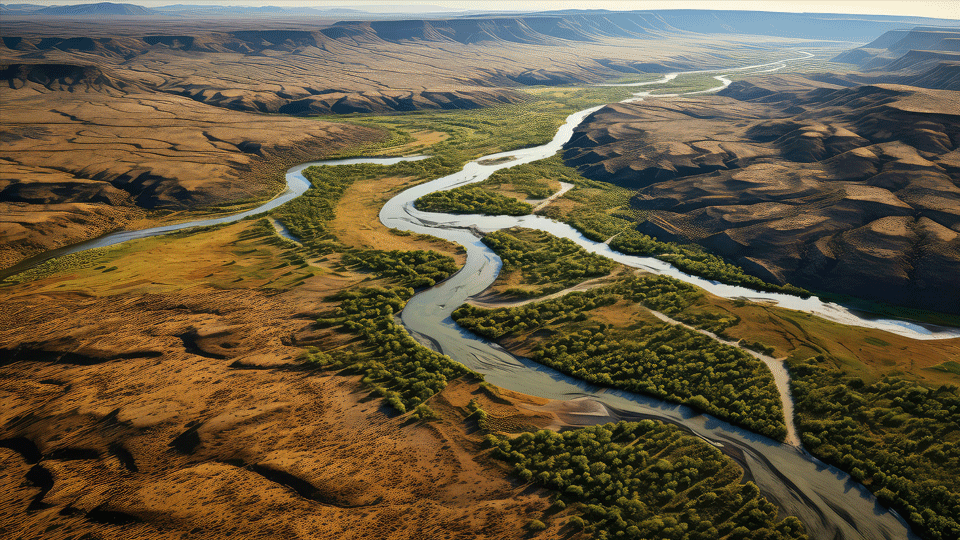
We look forward to welcoming you to Loughborough for the 2024 Annual Conference of the British Society for Geomorphology from 2-5 September.

This year the British Society for Geomorphology (BSG) Annual Conference, incorporating the 2nd Cuchlaine King Symposium, will be hosted by Loughborough University.
The BSG Annual Conference is the most important event in the BSG calendar, bringing together geomorphology researchers and professionals to share their work and network with peers. This year’s event will have a uniquely Loughborough flavour.
The oral and poster presentation sessions provide an excellent opportunity to share your latest research and practice, while the early career researcher and professional geomorphology workshops will offer a great chance to develop technical and transferable skills alongside new or familiar peers.
We will celebrate the BSG Medal and Award winners through keynote presentations, and look forward to hosting the second ever Cuchlaine King Symposium , supported by Earth Surface Processes and Landforms , which this year has the theme ‘Extreme Events in Geomorphology’.
There will be a pre-conference fieldtrip to Charnwood Forest which will explore links between geomorphological processes and the special geology in the Loughborough area.
The BSG Annual Conference has long provided a platform for early career researchers to share their work in a collegial and supportive environment, and we particularly welcome contributions from early career researchers and practitioners.
The Conference will have an online element, enabling virtual attendance for those who cannot join in person.
To register and find out more visit the Research website.
Call-for-Abstracts
We welcome abstract submissions from all aspects of Geomorphology.
Please submit your 250 word abstract by 1 July 2024.
CUET UG 2024 Day 3: Exam held in 620 centres; highest attendance in accountancy
CUET UG 2024: On Day 3, around 539,000 exam papers were administered, in subjects such as Geography (313), Physical Education,NCC,Yoga (321), Business Studies (305), and Accountancy (301).
Top Universities accepting applications
Check out the top universities accepting applications

Alivia Mukherjee | May 17, 2024 | 09:44 PM IST
NEW DELHI: The Common University Entrance Test - Undergraduate (CUET UG) 2024 exam began on 15 May 2024 at 2,157 test centres including 26 cities outside the country. The average CUET UG 2024 attendance for May 17 is 82.75% higher than the previous two days, informed the University Grants Commission (UGC) chief Jagadesh Kumar. CUET 2024 May 17 Live
Latest : CUET 2024 application correction window
Don't Miss: CUET 2024 syllabus (All subjects) | CUET sample papers with solutions
Suggested: Colleges/universities accepting CUET score
According to the official data, the highest attendance on May 17 was for Accountancy with 85% followed by Geography and Business studies at 84%. On May 17, around 539,000 exam papers were conducted, in subjects such as Geography (313), Physical Education/NCC/Yoga (321), Business Studies (305), and Accountancy (301), marking the completion of 9.31 percent of the overall examination.
The UGC chairman said, "During three days so far, we have covered 81.31% of the total students who have registered for CUET-UG. The average attendance today is 82.75% higher than the previous two days."
Over the course of day 1 and day 2, the NTA held tests for 2,591,000 (44.71%) and 1,581,000 (27.29%) combinations respectively, accounting for 72% of the total tests. In total, 81.31% of the CUET (UG)-2024 examination has been completed in three days (May 15, 16, and 17)
CUET UG 2024 May 17 attendance
Follow us for the latest education news on colleges and universities , admission, courses, exams , research, education policies, study abroad and more..
To get in touch, write to us at [email protected] .
CUET UG 2024: Meghalaya CM Conrad Sangma to raise exam delay issue with Centre; chaos continues
CUET UG English test, scheduled for 3 pm was delayed by over two hours due to a malfunctioning biometric system in Meghalaya centre.
Featured News
- Placements By Branch 2024: Around 40% EE, ECE students at IITs, NITs fail to secure jobs
- ‘No evidence of widespread abuse’: UK panel recommends retaining graduate route visa
- Placements 2024: Even BTech computer science struggles with 60-80% placed in IITs, NITs; AI jobs rise
- ‘Better decision’: Why Karnataka teachers welcome scrapping of the four-year undergraduate programme
- IIT Gandhinagar Placements 2023-24: 59% students yet to be placed
- IIT ISM Dhanbad Placements 2023-2024: 40% students yet to be placed
Latest Education News
Cuet 2024 may 17 live: nta cuet ug day 3 exam concluded; paper analysis, answer key, admit card download link.

Didn't do well in CMAT 2024, what next?

MSDE lays out framework for holistic development of trainers in the skilling ecosystem

TS ICET 2024 application correction facility begins; editable fileds

DCET 2024 registration window re-opens on May 20; fee, exam pattern

Related News
Wrong cuet ug 2024 question paper distributed in kanpur; re-exam on may 29: ugc chairman, cuet ug 2024 may 16 shift 1, 2 analysis: economics, physics paper moderate; unofficial answer key pdfs, cuet 2024 paper allegedly leaked at kanpur centre; students protest, re-exam date soon, cuet ug 2024 may 15 shift 2 analysis: english, general test papers easy; check unofficial answer key pdfs, download our app.
Start you preparation journey for JEE / NEET for free today with our APP

IMAGES
VIDEO
COMMENTS
The crucial point for a successful geography essay is selecting an engaging and appropriate topic. To choose a topic that resonates, consider current events, your interests, and the scope of your assignment. A good topic should captivate your interest and offer sufficient scope for in-depth study and analysis.
Mathematics education should prioritize the development of critical thinking and problem-solving skills, equipping students with the tools to tackle complex challenges with confidence and creativity. Encouraging collaborative problem-solving activities and open-ended investigations can help students cultivate a sense of perseverance and ...
Now, just as geography unveils such fascinating quirks about our planet, writing an essay on this subject can be an equally intriguing venture. Let's take a stroll through the world of geography essays together. We'll start by figuring out what exactly makes up a geography essay definition and then dive into the secrets of writing a great one.
Whether geography is thought of as a discipline or as a basic feature of our world, developing an understanding of the subject is important. Some grasp of geography is essential as people seek to make sense of the world and understand their place in it. Thinking geographically helps people to be aware of the connections among and between places ...
Essay Structure Each essay has the general structure of introduction, body and conclusion. Introduction There needs to be a clear introduction where you: o state what the essay is about o provide some background to the topic e.g. why it is important o set the parameters of your essays e.g. a case study of Brazil is examined (stating
Analysis Of The Geographical Position And Features Of Egypt. In this essay I going to speak about Egypt's geography, its latitude and longitude coordinates are 26.8206° N, 30.8025° E and Cairo (the capital city) is 30° 2' N, 31° 14' E. It is located in North-East Africa, and it has borders with the Red... Egypt. Geography.
Introduction to Geography Essays Importance of Essay Writing in Geography. Essay writing in geography is crucial as it allows students and researchers to explore complex environmental, physical, and societal issues. It enables the synthesis of empirical data and theoretical frameworks, fostering critical thinking and communication skills.
Physical, Human, and Economic Geography of Italians. Its neighbors include France Switzerland and Austria to the north, Slovenia along the Alps, and the Italian Peninsula, the islands Sicily, and Sardinia to the south in the Mediterranean ocean. Pages: 5. Words: 1371. We will write a custom essay on your topic.
When we say a professional piece of essay writing, we don't just mean the tone to be professional. We're saying the structure of your paragraphs and the length should be relatively similar. Do not write excessively long paragraphs, followed by a shorter one. Keep the length the same with the same font size and design.
Essay questions tend to use the command words "to what extent" or "assess". According to AQA, if the question includes the "to what extent" command word, you should "Consider several options, ideas or arguments and come to a conclusion about their importance/success/worth". On the other hand, if it is an "assess" question ...
Geography is an interesting subject, but it's equally involving because it requires a lot of reading and extensive research. So if you've chosen this IB subject for your Extended Essay project, you'll need to schedule enough time to choose a topic, develop your research, and work on the EE within the predefined scope of the assignment.
Geography Extended Essay Topics. The Geography extended essay is an assignment that requires you to conduct independent research on a topic of your choice. You then have to write a 4,000-word report on your finding, followed by three reflections to show your engagement and commitment to the research.
subject, title, and author. The SVSU library has the following databases appropriate for geography: 1) WilsonSelect - this social science database has full text articles dating back to the early 1990s. Students can immediately print these articles. 2) Geobase - this database is used mostly for physical geography papers; it has articles
Geography: Subject-specific guidance. See also: Extended essay guideand Extended essay teacher support material. Overview. An EE in geography gives the student an opportunity to apply a range of geographic skills to complete an independent and in-depth research investigation using geographic concepts, methodologies, theories and sources with a ...
The IB program requires you to write a 4,000-word extended essay on any subject of your choice. So if you've picked Geography as your focus area, you'll find this guide incredibly helpful. This guide to Geography extended essay covers the following: Definition; Choice of topic; Treatment of your selected topic and; The assessment criteria
Examining the role of geography in natural disaster management. Studying the cultural landscape of a specific region. Analyzing the geography of food production and distribution. Exploring the impact of transportation on urban development. Investigating the geography of renewable energy sources.
Geography EE should be an inquiry into a subject of personal interest that strongly connects to Geography. Additionally, your research question and conclusion should reveal some personal connection to you to outperform the accent. Therefore, bear that in mind. Table of Contents. Finding a topic for your geography extended essay. 1
Your genuine enthusiasm for the subject is a beacon that illuminates your research, compellingly drawing the reader into your analytical path. The Geography Extended Essay's ability to intertwine scientific investigation with cultural understanding makes it stand out. It offers a platform where quantitative data meets qualitative insights.
This should include: the title of your extended essay. the research question. subject for which the essay is registered... Geography! (if a world studies essay also state the theme and the two subjects utilised) your candidate code. the word count. There should be no candidate, supervisor, or school name on the title page, page headers ...
Geography is a graphical subject and maps, graphs, infographics, images and tables from literature sources can be included in the essay. They must be carefully selected, labelled and referenced . They should only be used if they are directly relevant to the research question, contribute towards the understanding of the argument and are of a ...
EE Geography A. The Classification of Dulwich College Singapore's Microclimate: An Inquiry into the Institution's Degree of Urban and Nature Reserve Microclimatic Character. EE Geography A. High scoring IB Geography Extended Essay examples. See what past students did and make your Geography EE perfect by learning from examiner commented ...
Subject. Geography. 999+ Documents. Students shared 1033 documents in this course. Degree FET. School Avonford Secondary School - Durban. Academic year: 2023/2024. Uploaded by: Ziyanda Biyela. Gratton School. 0 followers. ... GEOGRAPHY ESSAY WRITING COMPOSITION AND STRUCTURE OF THE ATMOSPHERE.
Home prices rose at an unprecedented pace in the aftermath of the COVID-19 pandemic as interest rates fell to record lows, the large cohort of millennials aged increasingly into prime homebuying years, and the supply of housing available for purchase remained limited.
Analysis of more than 40,000 university application essays found that gradual transitions between chunks of text correlated with higher marks. Credit: Dusan Stankovic/Getty. Aspiring students who ...
The exam was conducted in 4 shifts for different papers, viz., Geography, Physical Education, Business Studies, and Accountancy, in pen and paper mode. ... CUET Exam Analysis May 17, 2024: Subject ...
Subject: Geography. Age range: 16+. Resource type: Assessment and revision. File previews. pdf, 1.11 MB. AQA A Level Geography 2024 Prediction Paper. Please note this only contains questions on: Water, Carbon, Coasts and Hazards topics. I create these papers through taking the specification and colour coding what has come up before. I then look ...
We look forward to welcoming you to Loughborough for the 2024 Annual Conference of the British Society for Geomorphology from 2-5 September. This year the British Society for Geomorphology (BSG) Annual Conference, incorporating the 2nd Cuchlaine King Symposium, will be hosted by Loughborough ...
On May 17, around 539,000 exam papers were conducted, in subjects such as Geography (313), Physical Education/NCC/Yoga (321), Business Studies (305), and Accountancy (301), marking the completion of 9.31 percent of the overall examination.